#yes he has done things that are considered to be negative to the protagonists and kabru in particular
Explore tagged Tumblr posts
Text
i feel like it must be said that i very much enjoy mithrun, he's one of my favorite characters, but the way the community at large handles him with safety gloves as if he'll break at the slightest criticism is very frustrating considering his role in the story is that of an antagonistic force
#like. i think its fascinating how ppl forget that he and the canaries are very much the antagonists of dm#no hes not the villain. no hes not the bbg the gang wants to defeat#but in terms of literary roles. he is 100% the antagonist#in that he directly opposes what the protagonists (laios + marcille)#are trying to do#yes he is incredibly sympathetic and enjoyable as a character#yes he has done things that are considered to be negative to the protagonists and kabru in particular#these are not mutually exclusive#part of the reason why i enjoy mithrun so much is bc of how layered he is#not even touching on how hes also a critique of how the disenfranchised still benefit and perpetuate their privilege#he is someone who is disabled and treated poorly by the system#but he is also a key factor in maintaining that very same system's status quo#and not unknowingly. he even says to marcille that he knows hes lucky in that one extra#dunmeshi#chattering#does this make sense. i have so many thoughts ping ponging off the walls of my brain rn
23 notes
·
View notes
Text
Female Power Done Right: A closer look at Pian Ran from TTEOTM
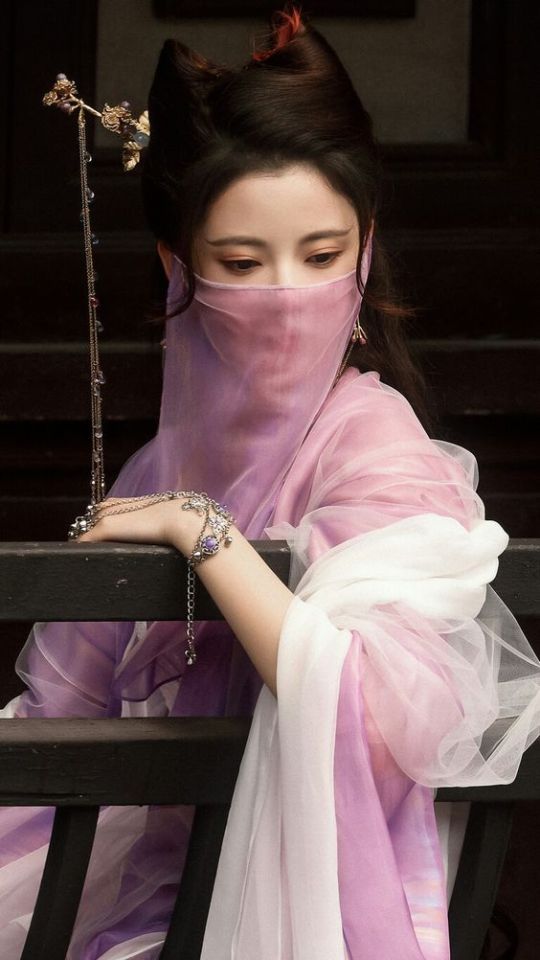
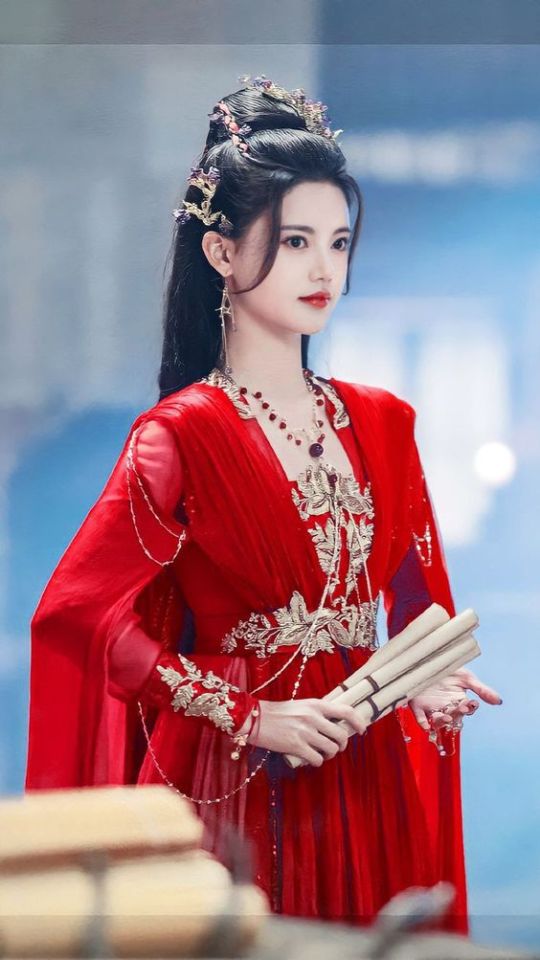
The seductress: regulating sexual morality
Female characters have always been stereotyped in popular media. While this isn't limited to the portrayal of women, it has affected them disproportionately and usually in a negative way. There are a number of common stereotypes of how women are portrayed, such as the virtuous woman, the seductress/femme fatale, the Mary Sue and more. While I don't want to say that TTOETM doesn't rely on these kinds of stereotypes to tell its story, the show does get some things right when it comes to its female characters. Pian Ran is the best example of this.
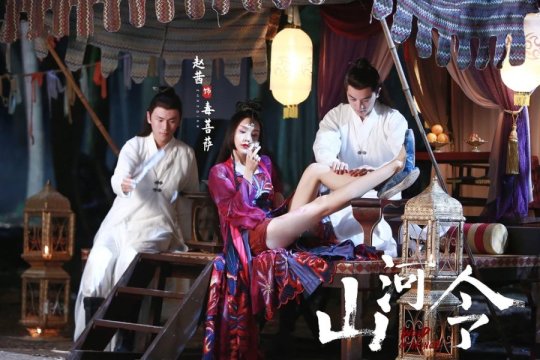
Most temptress are villains, because female sexuality is often framed as something negative, something dangerous. Sexual morality serves to regulate gender relations, for example through various sexual taboos and prohibitions on premarital and extramarital sexuality or homosexuality. In the major religions and many cultures, sexuality is traditionally placed in the service of procreation. In the ascetic-monastic traditions of Hinduism, Buddhism and Christianity, which are characterized by sexual renunciation, sexuality is equated with ignorance, desire, attachment or sin and is considered an obstacle to salvation. As women are identified more strongly with physicality than men, sexuality and instinctually in all the religions mentioned, the widely received stereotype of the sexual seductress emerges, which has been used to justify a wide range of discrimination.
Therefore, seductresses are not about female sexuality, they are (through the male gaze) objects of sexual desire for men, while also being a negation point of sexual morality. Virtuous women, especially protagonists, are often sexualised, but not portrayed as sexual beings. In contrast, sexual women are often the competition of the main character. They tend to use their physical attractiveness to attack or steal the main character's love interest, or to overpower the hero with their evil tricks. For this reason, they are often associated with animals that are seen as deceitful, cunning, poisonous or dangerous (e.g. snakes, scorpions, foxes).
At the first glance, Pian Ran fits this archetype well. She is a fox demon, who feeds on the life energy of men. She seduces them, using their sexuality for her own gain and entertainment. Pian Ran also dresses "provocatively" and doesn't conform to social conventions. When we first meet her, she is playing the historical version of strip poker, not just for the money, but because the desperate men amuse her. In the same episode, she forces Ye Qingyu to accompany her to the market and uses her sensuality to throw him off balance.
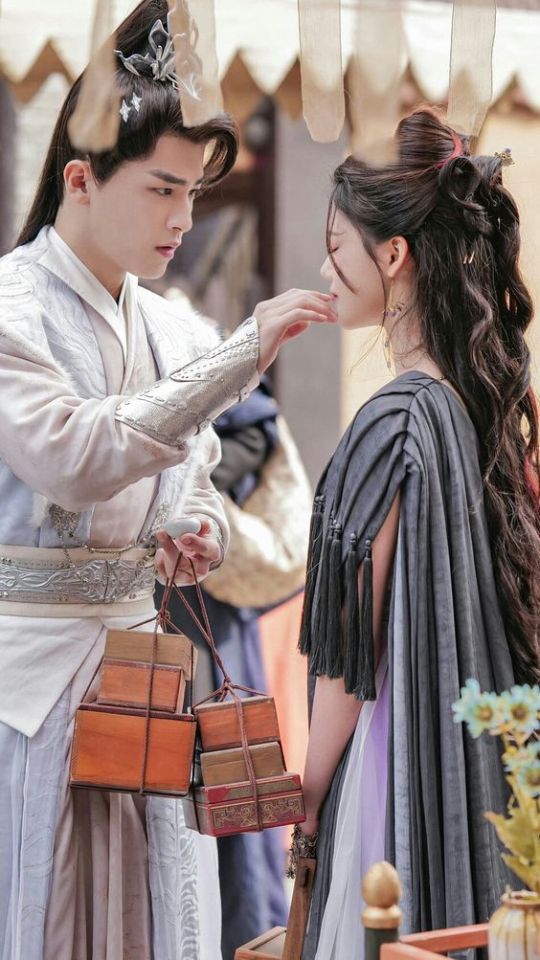
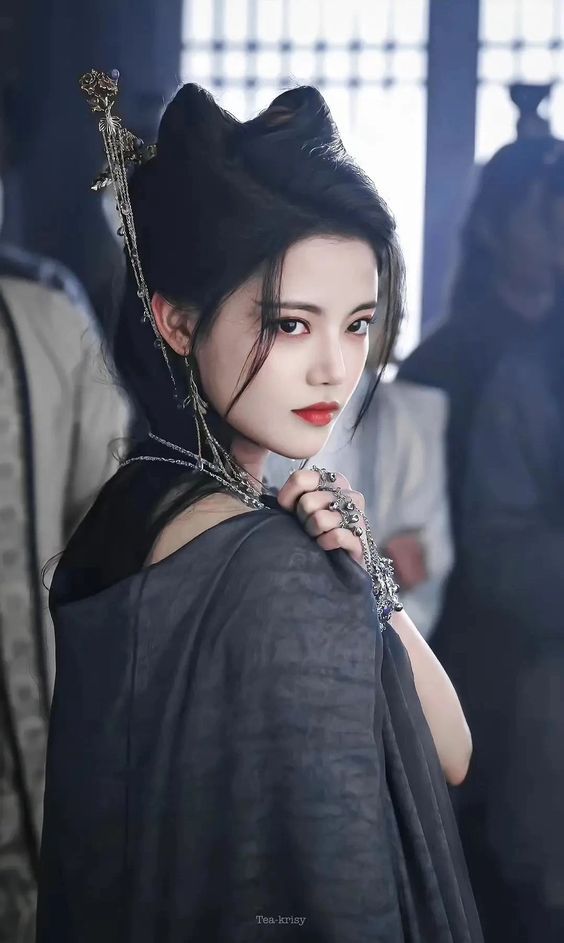
However, Pianran also subverts this trope. Her sexuality isn't portrayed as something negative, it's accepted by the people around her. Ye Qingyu never judges her for it, even though he is the polar opposite. Ye Xiwu never looks down on her either, instead she comes to him for advice and even flirts with her.
Sun Zhenni's performance deserves a lot of praise. Her sexiness doesn't feel "sticky" or "creepy" to me, like many other characters of similar type do. She has a natural sensuality that isn't over the top, more sassy than naughty. You can tell that she studied her character a lot and tried to portray her as nuanced as possible.
Pian Ran is also much more than just another fox demon and seductress. She is a complex character. But her main theme isn't really seduction - it's working life.
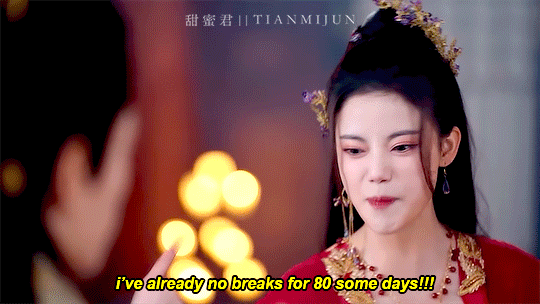
Pian Ran vs. work life
This theme runs throughout the drama, from Li Susu offering her a letter of recommendation for a particular sect when they first meet, to Pianran's work for Tantai Jin - and her resentment of it.
She has to work to survive - literally, as Tantai Jin tricks her into believing she has swallowed a pill that will give him control over her life. "Take the pill", which will change your life and take away your freedom, is also a reminder of how certain drugs and their side effects work. While she's not without a certain amount of freedom and has her own command within the Jing Kingdom, she's tied to Tantai Jin's command and rigorous work schedule.
Our girl is a for sure a regular on r/antiwork...
This theme makes her a relatable and likeable character. It also shows how her character is a comment on current social issues, beyond gender roles. This is one of the strengths of TTOETM, it’s strong social and moral message that goes beyond the plot of the drama.
Pian Ran vs. love life
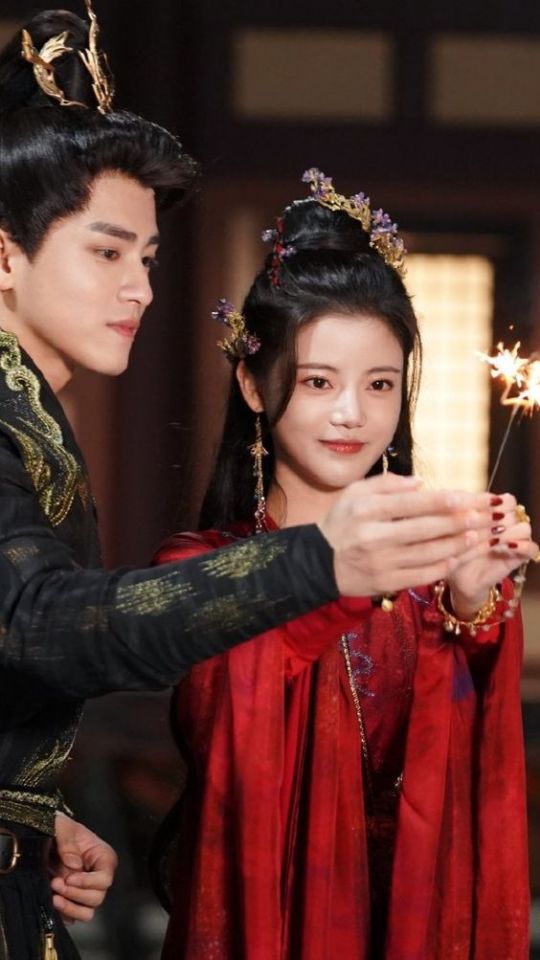
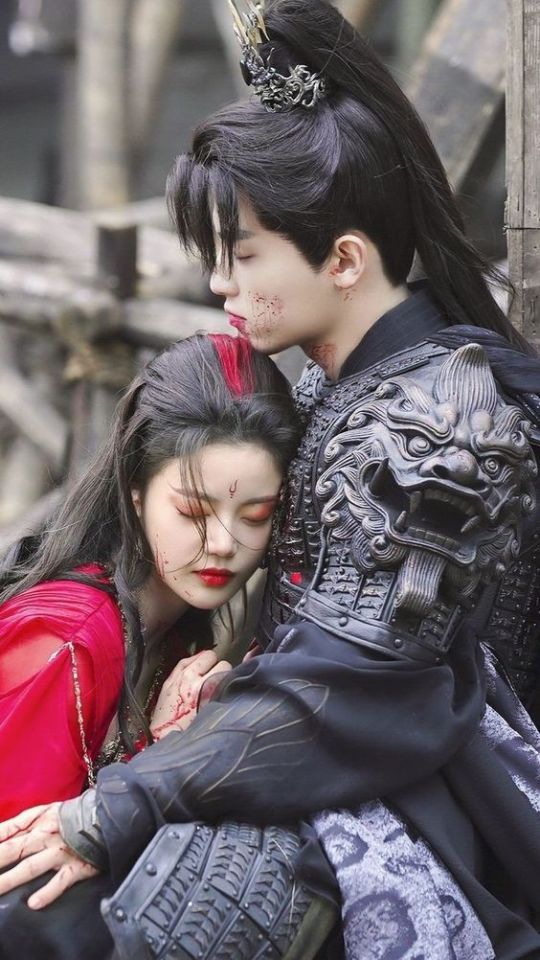
As a character, Ye Qingyu is the opposite of Pian Ran: Virtuous, very righteous and rigid. But he never judges her for her behaviour, he always understands her and gives her space. And most importantly, neither of them changes who they are as their relationship progresses. She doesn't suddenly become a modest woman, he doesn't turn away from his ideals - except maybe in that cut arc in Jing Kingdom in the 3rd arc.
In many ways, Ye Qingyu and Pian Ran embody the classic trope of the seductive and virtuous hero: she affects men in a certain way that causes them to stray from the straight and narrow or interferes with their domestic arrangements. For example, when he spends the first night with her and thus neglects his duties as head of the family, or when she contributes to his changing sides and joining Tantai Jin. In short, she is disruptive.
When she advises Ye Xiwu/Li Susu on how to seduce Tantai Jin, she suggests various manipulation tactics to gain his attention and favour, but Pian Ran also gives genuine advice - to both of them, actually (although sometimes it's my accident).
One could make the argument, that they were aiming to frame her initial strong sexuality as a coping mechanism due to the loss of her husband and love threads. The absence of her love threads manifests quite different to Tantai Jin, mainly in form of attachment issues.
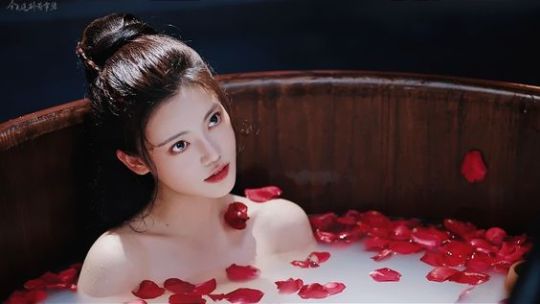
However, the show doesn't try to make a point about female sexuality by emphasizing a change in Pianran's behavior based on finding the right man. If anything, it's Ye Qingyue who meets her halfway by having a premarital affair. What I like most about their relationship is that they are each other's equals. They both have high ranks in Tantai Jin's kingdom and army, and he listens to their advice and treats them equally. Moreover, Pian Ran is never a damsel in distress. Even when Ye Qingyue dies for her, it is because she was blindsided by the attack while she was winning her own duel. In the end, she shares the fate of most seductresses who disrupt the social order - she dies (if they don't join a convent). The difference is that her death is a tragedy and not framed as a regulation of sexual morality and gender relations.
Female Friendship
Before I dive into the relationship of Li Susu and Pianran, I want to comment on the common dualism of the sensuous vs. the virtuous woman. Li Susu (or Ye Xiwu) is not the virtuous heroine, it’s (again) Ye Bingchang mirroring Pian Ran. This is something that subverts the whole trope! It's the virtuous woman who become disruptive and falls from grace, while Pianran becomes a righteous heroine. However, while Pianran doesn't become virtuous, Ye Bingchang tries and fails to use seduction to manipulate Tantai Jin. She also has an additional set of love threads that make her seductive to men without using her sensuality or sexuality. It's a fascinating dynamic. As I said, TTEOTM is not a perfect show with a feminist message, but it certainly tries to subvert gender stereotypes - and not just with its women, but that's another issue.
Pian Ran's third important role in TTOETM is that of Li Susu's friend, who supports and guides her. What makes their dynamic so interesting is that while Pian Ran looks younger than Li Susu, she is considerably older (well, if you count age by years lived, not by date of birth). They are flirtatious, they share a horse and a bed, and they pass the Bechtel test! Li Susu even risks her health to cure Pian Ran of Tantai Jin's blood curse.
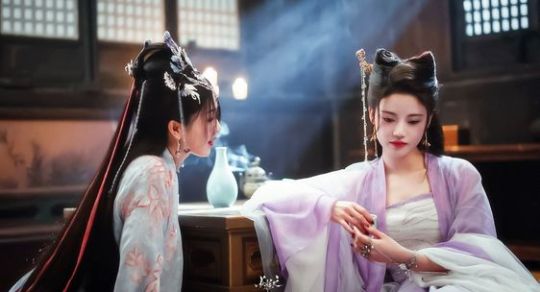
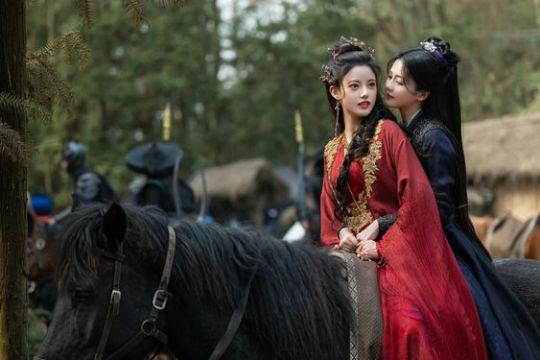
Both subvert gender expectations in their own way. They are strong characters without abandoning their femininity. The empowerment and the feminist ideas, they are embodying, also come natural to the storyline and are not just tropes. Therefore, they are relatable characters for a modern audience (except when they are not).
Edit: Got rid of some spelling mistakes!
173 notes
·
View notes
Note
Seeing that you have already completed a few endings of HL, what did you think of the characters in general?

alriiiiiiiiight! it is time to put on a tierlist! (also would love to see your own tierlist friend @plaindangan ) As you can see in a glampse, I think its the most solid cast kodaka ever produced, uchikoshi too, most insane too, (managing to topple even akudama drive in batshit insanity XD) For the rest of the post a bit of clarity : so far i played (in order) the coming of age route. the takumi cult route. the 2nd scenario / "001" route. the v'ehxness route. from now on spoilers.
so if you played the game, for the VAST majority of my play time, like, 70% i think (everything outside of route 0 / the introduction.) darumi has been deadrumi, I just started a route in which she actually lives! but it cost us a lot, the route wasted no time putting her more into focus too, making her a surprisingly good emotional support for takumi and tackling stuff like her fearing "true death" when it was about to happen to her, no matter how insane and manic and darumi our darumi is, at the end of the day, she dont trully want to die. And i really like that. I will give a quick resoning for all the characters. Takumi
I didnt think it was possible, but while very different, he managed to reach the shuichi saihara quality of protag to me. The different routes allow us to see different side of him and his evolution, and struggle, and he is so will driven to protect those he loves, I just love the guy. he is the character you can feel the most influence from uchikoshi too, hes really a blend of how those 2 create protags. Nozomi
Due to route 001, i see her as just as a protagonist, if not even more than takumi, at the start of the game shes just a nice character but shrouded in mystery, that then evolves to become takumi's "goal' of sorts. But the really good thing about her character is that she is much, much more than that. "I dont care about humanity, I just want to protect my friends" in route 001 post the origins reveal go insanely hard, she LOVES the team so much, and dont get me started on the tragique of her relation to takumi, she loves him, romantically (in every route i played so far) but the one he trully chases after is karua, and its both beautiful and tragic and im tearing up just thinking about ending 001 again AAAAAAA. I think she might just be my favorite female character in all of kodaka
Shion / FB / whatever they name our good boi in other routes
My very first route was coming of age, so of course i feel very attached to our boy. he is just the purest kid I think I ever saw, and (along with the two above) I just, really want to see him be happy. I Really like his parallel and relation to takumi, his own philosophy. And also i ship him with tsubasa. (real quick, gonna tackle the aspect that is gonna become controversial, the few negative critics i read of people who clealry played the game (because a lot of others feels like they didnt, or wanted to hate this game from the get go). Regarding the incest / clone situation I simply doesnt consider it to be incesto to ship any member of the team with somebody else of the team (appart from nozomi cos shes human and eva cos she aint related to them) Yes, the characters are clones based of shion, and on a pure "genetic" standpoint, that makes them a familly, and shion their dad, and the gang in 001 accept that fact, treating themselves as both friends, and a familly. But no i dont think its incest. Did you look at them ? It's obviously clear there was a lot of genetic modification done to them, they grew into very different beings, they arent humans either, but modified clone futurans, so no idea how the genetics even works here. so You dont have to feel bad shipping them together, nor any of them with shion if thats your thing, (just not the foetus body of him cos that would be a bit weird ? then again that foatus is shion, what i mean is, dont fuck the foetus and we're good) -----
As for the rest, i fear not having the place, but if you want me to detail more for the rest i'll do it later! Quicky for the top placement : kyoshika is HILLARIOUS and so cool and i love her, takemaru is mondo but alive and somehow even more of a BRO, the twins have excellent comedic timing, especially detective kako moments, and ima is a piece of shit, but hes not ill intend (once he joins the group for realsies) and ima-sirei is still the most hillarious thing that happened in this game. Tsubasa is just such a good girl, moko herslef is alone to make me wanna go back into wrestling and shes just so cool, hiruko is surprisingly more deep than route 0 led me to believe (and shes a Q U E E N in every sense) and nigou is the nozomi of this game, but his whole thing is that theyre a goofier more naive and friendly sirei. Which i really like. just know that the worst placements are solely here because they either lack that one moment that makes me go "yeah no ok youre just a 5 star meal" or just screentime (darumi, non brainwashed eva (i got spoiled theres a way to see non brainwashed eva, but i really hope its not a thing that happens only in one route, but multiples, Cos I want to learn so much about eva (and the other commanders and their culture)). Usually when any character is the focus in an arc, theyre great. the worst i think is shouma ? he is hillarious or very emotionnaly interesting when the arc is about him, but when he plays a side role his whole character revolve around the joke of him finding synonymes of "im a shit who hates myself" and that really hinders his quality, i love his relation to eva or takemaru or the group in general tho. kinda same goes for gaku, but gaku has the strong positive of being realllly good at boosting the moods of others. as for kurara and yugamu, theyre ALMOST goats. Oh and the eito tier is more "technically youre an antagonistic force, at least partially / from a moral standpoint, your character kinda deserves its own tier, i really like your presence here but i cant quite call you the goat" ----- LITTLE UPDATE, DARUMI IS NOW GOAT, i dont know if i just so happen to hit the one route where the girl just decides to become the best fucking girl in the game, but she is! there's a chance its gonna lead to romance route, but honestly i see it more as a strong friendship from a girl who just realized stuff about herself and does the best to make the first real friend she made feel better. Since i Re-watched bluelock (cool manga, that i follow semi regularly but the Neo egoist league is so godamn LONG for nothing, and also I dont entirely vibe with the author writing regarding completing arcs and side characters being used for more than just an arc, JAGAAAAN had the same problem (same author if i remember correctly) (yes even season 2, and yes its still horrendous (especially the preparation to the U 20 VS blue lock match, the rest was a bit better, but man, whats the story behind... that ? did they really thought "ok, they like aura, put EVERYTHING in the auras, and no money elsewhere) Think bacchira isagi from early arcs / season 1.
13 notes
·
View notes
Text

answering this portion of the q from earlier-
There’s honestly plenty of potential ‘bad’ takes about SE and the story’s characters that anyone out there can make- maybe they make assumptions based off the trigger warnings or themes, maybe they see my little doodles and mini comics about just how fucked up these characters are and it’s not their cup of tea, etc etc. Weirdly enough tho, that’s something that i’m looking…forward to seeing? Like just the potential drama and arguments over certain things/plotlines/characters in this story sounds like it’d be juicy. I can see a future me holding a glass of wine laughing maniacally at the computer screen all giddy with excitement over it. or something idk-
BUT specific takes….here’s a rough list (ALL COMPLETELY HYPOTHETICAL):
“Lack of wholesome queer characters and plotlines” or something along those lines. Something to the tune of “i’m using fiction to escape reality so i don’t want any queer stories to be edgy and dark and violent, i want all the characters to be pure cinnamon rolls who’ve never done anything wrong EVER”, and just make assumptions about SE over the majority of the cast being queer AND horrible people. Like if SE isn’t your thing, that’s fine. But if someone were to say that its shit for including darker themes then I’d feel like they’d need to retake some highschool english classes or something
“This story puts queer people in a negative light” Shocking development at 1am EST…QUEER PEOPLE CAN BE EVIL AND DO HORRIBLE BAD THINGS!!! THE HORROR
“Why isn’t everyone’s identity and pronouns spelled out for me from the moment they’re introduced” cause immmm lazyyyyy and don’t really consider their identities as super ultra mega important in a way-
“WHY ARE THERE SLURS!!! WHY ARE SOME OF THE CHARACTERS RACIST!!!!!! THIS IS CONDONING-“ the world ended in the 1960s and everything got worse from there. the door is that way 👉🏼
“Everyone in this story is fucked up. Nobodies normal, all of these characters are just terrible, horrible people, how do i root for them” then i’ve accomplished SOMETHING that i’ve wanted to do FOREVER-
“Why is the protagonist such a crybaby”. He’s 14 and a little bit fucked up okay. and he IS a baby so THERE
“Why is the protagonist boring” Cuz i’m tired of the ‘uwu powerless softie turns out to be the son of fucking GOD all along’ trope in a way. Dez is important in his own way and this just makes the story more interesting when cosmic forces are pushing down on him and his bestie and he kinda has to go a little loco to deal with it
“Why is the protagonist chubby/fat, it just isn’t realistic for the setting and type of story” what if i killed you violently with a rock
“The Martians aren’t realistic and their biology/culture/behavior is confusing” yes it’s meant to be. They’re artificially created, their eyeballs function as ovaries, their blood is literal oil and they go off like nukes when they die. It’s meant to be kind of stupid and self indulgent and their origins are a mystery to themselves
“The Martians do incest? That means you SUPPORT incest!!!” No, absolutely not. The story doesn’t even make it in a positive light, it’s very much a product of their oddly misogynistic, mysterious culture, and isn’t touched upon too much in the story. Also they’re aliens and don’t follow the same biological rules as humans at ALL.
“Francis is terrible trans rep” SHE’S MEANT TO BE TERRIBLE
“Francis’s alcoholism is condoning underage drinking” Okay man
“Everything is way too convoluted and there’s just too much going on, who would want to read this” MEEEEEEEEE!!!! I WANNA READ THIS
“This story glorifies child abusers cuz of the existence of a character like Thursday and how he’s often portrayed-” Are you hearing yourself rn. stop and think. for a Moment ✋🏼🛑
“I can’t believe you’re trying to paint Friday/Hammond as a good person for-“ when. When did I say that. I’ve been explicitly saying that they’re both wrong this entire time-
“Having the man-eating Martians and Chimera be brown skinned is racist” shore thangggg buddy
that’s all i can think of off the top of my head rn…tbh i think the fake ones from before are a lot better than these ones LOL
6 notes
·
View notes
Text
Little Mouse;; PSH
Word Count;; 2.4k
Genre;; Yandere + Smut
Pairing;; Seonghwa x Reader
Summary;;
You’ve escaped the toxicity of your past and greener pastures lie ahead… yet there’s a dark cloud brewing overhead, brimming with the promise of retribution. Sometimes it’s better to just give in and weather the storm.
Warnings;;
Dark fic!! Toxic!Seonghwa, abusive/loveless relationship, obsessive behaviour, reader is a sub, oral sex (m!receiving), degradation + use of ‘Daddy’, sadistic Seonghwa, threat of a belting, video filming w/ threat of blackmail, slight dacryphilia
Notes;;
Valentine’s Prompts : Cat and Mouse + Rose Petals
I’ve gotta post this so I can move on tbh
Second half went to shit because I was uncomfortable lmfao
My beta reader said, "Seonghwa is an asshole! He made me feel bad about myself!" so fair warning
Main Masterlist || ATEEZ Masterlist || Valentine’s Masterlist
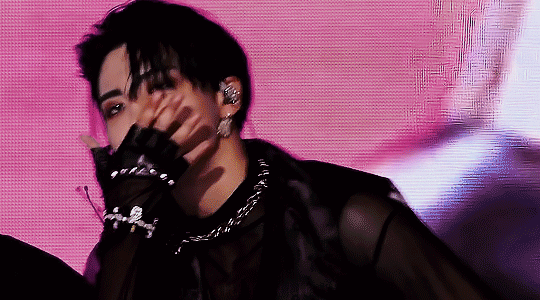
You met a boy a few weeks ago and he’s everything. From his dazzling smile to his kind eyes and his warm personality, he’s what many would consider ‘perfect’. When he calls you late at night it’s to hear you talk, not to summon you to his side. His gifts are the type you can show your family rather than hiding them within your closet. He even compromises. For the first time in years you’ve been given a voice. And the best part of it all is that he wants to go steady with you.
As in your boyfriend.
You, with a real, proper boyfriend. If only your younger self could see you now, living the life of a romance protagonist – grand gestures and all. He’s on the flashy side but it’s in good faith. No harm, no foul, even if sometimes it’s embarrassing when done in front of your coworkers and friends. At least he’s open with his feelings unlike your last… fling. You can’t even call it a relationship; he’d never acknowledged you as anything other than his little mouse.
Clenching your hands around the steering wheel, you inhale fresh air into your tired lungs. Your exhale comes too soon, too fast. Inhaling deeper, you let loose the anger you have toward him. Not in an explosive outburst but with a gentle sigh. Negativity breeds negativity and you’ve had your fill. Good things are on the horizon for those who seek them out and you’re ready to reap the seeds of change you’ve sown. It’s only getting better from here on out, that’s what your life coach says, and this year it actually feels true.
And so you had packed up your things, deleted his number, and met someone better.
You’ve been born anew and given a second chance.
Manifest your dreams.
It’s a mantra (one of many taught to you through some online self-help program that costs more than your mortgage) that you repeat to yourself. Over and over the words loop inside your brain as you pull up to your house. The ‘spend money to make money’ has yet to prove true but you plan to add a garage once it does. For now you settle for parking in the driveway and going through the motions as you put up the sun shade. It darkens the vehicle, makes it cosier.
Taking out your phone you check for new messages, brave enough to face the repercussions of your actions now that you’re alone and detached from the world. To your relief there’s nothing from either man. Perhaps he’s letting you go without a fight, maybe even moving on to his next toy. While that does alleviate some tension, it’s only temporary. Your stomach is quick to fold in on itself, stretching and contorting at the cruel realisation that you can’t ascertain just which of the two you wish the statement were true for.
Brilliant streaks of purple and orange paint the sky as dusk approaches. If you stay in your car any longer, night will fall and the air will turn bitter. Grabbing your bag, you slip your phone back inside before walking up the narrow pathway to your quaint home. It’s nothing extravagant but it’s yours and there’s not very many things you can say that for. The porch features a rickety chair, two (dead) potted plants, a welcome mat that’s years overdue for a replacement, and… roses?
Blood red petals greet you upon your approach. Most have blown away but some still linger, welcoming you home. Aside from the glass vase holding the bulk of the flowers, there’s some shoved in between the main door and the storm door. It’s just the buds, as well as a plethora of loose petals. In a way they beckon you to enter. Grabbing the vase, you indulge them.
The petals tumble around your feet the moment the storm door creaks open. It’s a stark contrast; the ruby red dripping onto your fading black shoes is reminiscent of an artsy noir film. Despite the queasiness it invokes, you can’t help but smile. This is exactly the kind of outrageous display your (dare you say it?) boyfriend is prone to. Taking a deep breath, the sweetest aroma caresses you. It’s everything you could ever wish for.
He’s everything you could ever wish for.
You reach for your phone to shoot off a text to your boyfriend when a cold gust whips down the street. Violent and sudden, it steals several lawn chairs and flamingos, snapping them in half as they slam against cars and fences. The rose petals and their enticing fragrance are blown away without a trace. Picking up in velocity, the wind slams the glass storm door into your side, threatening you to go inside or face its wrath.
Sometimes it’s best to relent and just weather the storm.
Pushing open your main house door, you turn back to grab the storm door lest it be torn from its hinges. It’s a game of tug-o-war. Forced to abandon the rose vase on the ground, you dig in with your heels to get the upper hand on the torrential winds. Leveraging your body against the threshold, you apply what little knowledge of physics you recall from school to create a fulcrum between the wall and your knee. It does the trick and the door shuts with a thunderous crack. With no energy to fight further, you close and lock the house door as well.
The house is plunged into darkness. Unlike the car, it’s not comforting in any way, shape or form. Even though it’s been your home for several months now, there’s something unnatural about the way the shadows sit. You toss your handbag into their hungry grasp. It thuds against the couch.
While the storm has yet to reach peak levels of destruction, it may have still killed the electricity. You pray it hasn’t. Finding the switch through pure muscle memory and instinct, you flip it on and--
Light floods your small living room. Licking up the length of your spine, shivers wrack your body into a tremor. Everything is red. In the seconds it takes for your eyes to adjust, you’re reminded of Seonghwa. He liked you best when you were red: red lips, red lace, red eyes, red cuts.
Even when you distinguish the sea of red on your beige carpet to be roses, tears sting the corners of your eyes. This isn’t right. Petals litter your floor, lining a path up toward your bedroom. A pair of teddy bears await you at the top of the stairway. One is holding a rose while the other is made of roses.
Step by step you make your way to the top.
You don’t bother to wonder how he got inside. When Seonghwa wants something, he gets it. And who else but Seonghwa would go to this much effort just to torment you? Playing with your heart is a pastime he can’t help but indulge. Love is, after all, a game to him. You’re a game to him.
Picking up the fluffy bear, you sniff the rose attached to its little paw. It’s pointless when the whole house smells this way but the action itself seems like something a leading actress would do before she smiles coyly at her beloved. You cradle the bear to your chest and continue toward the inevitable, following the path he so carefully laid out for you.
The closer you get to your bedroom, the less fight you have. There’s a faint glow colouring your door in orange and flickering shadows. Despair weighs you down until all you can muster is the dragging of your feet along the plush carpet. Beyond the spattering of candles no doubt lies a punishment. It’s one you deserve, which makes the whole situation worse.
Collecting the few articles of clothes he allowed you to keep at his place in the middle of the day with nary a note was a low-blow, even for you. And though you weren’t a couple, it’s still courteous to officially end a relationship you never plan to revisit. Blocking him on all your social media and changing your number wasn’t the right way to do it. Facing him head on, however, never felt like a viable option.
With your hand on the knob, you look down to take a deep breath and regret it immediately. The candles are set up in the shape of a heart. Another display, another act. He’s meticulous and sadistic, and this is a statement. How’d you ever get tied up with such a monster? Not bothering to hold back, tears crawl down your face as you push open the door. At least now you’re bearing gifts - he always did love to see you cry.
Sprawled out on your bed, he’s staring at the ceiling when you enter. His leather-clad legs are spread wide and his arms prop his head up. Disappointment twists his lips into a scowl. The effect it has - he has - on you is instantaneous. Dropping your head in shame, you close the door and take a step toward him, embracing your teddy bear tighter for support.
Rising to a sitting position, he crooks his finger and beckons you forward. “Come here.”
“Seonghwa, I’m sor–”
“Quiet.”
Your mouth clamps shut. Doing as he says, you cross the room in silence. He stands to shimmy out of his plain white shirt, abandoning it on the floor. The action leaves his hair tousled. As always, he’s a sight to behold.
Clicking his fingers and pointing down toward his feet, he says, “Get on your knees.”
“But–”
“Now.”
Ever dutiful to his command, you drop to your knees. The carpet does little to cushion your fall and a sharp jolt claws up your leg. You know better than to keep him waiting, however, so you ignore the pain in favour of unbuckling his belt. The metal is cold to the touch and your fingers tremble. While the design isn't intricate you struggle to remove it, earning an impatient sigh.
"Fucking useless," he mutters, slapping your hands aside. "The only thing you're good for is sucking cock, isn't that right?"
You nod as he removes the belt with deft fingers. Dark eyes glower down at your quivering form. Seonghwa has a way of tearing people apart with a single look – you've always felt so insignificant beneath him.
Unable to hold his gaze, you drop your head. Just when your life was taking a positive turn, he had to stroll back into it. While you didn't know the 'how', the 'why' of his return was more pressing. Couldn't he find a new plaything to break? Why did it have to be you?
Somewhere overhead comes the crack of his belt. It whips through the air and a small breeze rushes against your face. You flinch, falling back on your heels. Tears well in your eyes. At a pace much too slow for his growing impatience, you return your focus to Seonghwa.
"Pathetic." He laughs. It's a venomous sound, filled with malice and malintention. "Hurry up."
It's easier to work under great pressure; buttons and zippers are undone with little hesitation despite how bleary your moist eyes are. Smooth like marble, you pull his pants down his soft thighs. You don't bother to take them off completely, instead hooking your fingers within the band of his briefs. Guilt clenches at your gut.
"Seonghwa, I ca–" You gulp when his eyes narrow. A scowl pulls at his lips as he shakes his head. The crack of his neck is ugly and violent. Gripping the belt buckle beneath paling knuckles, his spare hand tightens around the loose end, snapping the length into a thin line. "Daddy. I meant to s–"
"God, I hate you," he spits, contempt seeping out from his every pore as he tosses the belt onto the bed. It's still within reach should he decide you need a punishment, a silent warning to keep you compliant.
"I'm sorry," you murmur, biting back your sobs. From experience you know it annoys him more when you babble and whine, and while he loves torturing you to the point of tears, he despises hearing your 'cauterwauling'. "Sorry, I'm sor–"
Pulling his cock free, he slaps it across your face. "Just shut up and suck."
He tastes salty on your tongue. You take him deep, holding his thigh for support. When his cock hits the back of your throat, you wince. It’s too much. Tears spill down your cheeks. Your soft sobs vibrate around him and he groans, using his thumb to wipe the moisture from your face. He offers no respite as his hips piston forward. There’s no space for anything other than him, no room to breathe when he’s filling you completely.
Looking up at him with heavy eyes, he’s a blur before you. One hand rests around your jaw, locking you in place while hollowing your cheeks. He holds something rectangular in the other. It gleams in the limited lighting, taunting you. Squeezing your eyes shut, you blink away the tears.
“And I thought you had a boyfriend now?” he snickers, watching you through the screen of his phone. “Should I send him a little video? Show him how much of a slut you really are?”
Your breath hitches. Using your stunned state to jut forward, he pushes his cock even deeper until you’re gagging around his length. He discards his phone on your bed before digging his nails into your scalp. Stinging pain explodes outward from his touch. Pushing through the ache of your jaw and the desperate burn of your throat, your tongue caresses him. Your technique is sloppy, drool leaking from the corner of your lips.
Growing bored with your pathetic display, his foot tapping in quick succession, he releases you. You fall away, dropping to your hands as you sputter and cough. His cock shines with a thin veneer of saliva. Hard and proud, Seonghwa stands before you with a disdainful smirk darkening his edges. He strokes himself twice before snapping his fingers.
“You’re not done, little mouse.”
This time you don’t hesitate. You lick his pre-cum, tongue swirling around his tip before deepthroating him. It was your own naivety that led you here; deep down you’ve always known you couldn’t escape Seonghwa. There’s no point in trying – you belong to him. You moan around him, just the way he likes, and his hand finds purchase atop your head. Enclosing you within his palm, he pets you, the gesture almost comforting. Leaning into his touch, you suck his cock with fervour. His words are a purr that echo within your skull.
"Guess my little whore still loves Daddy best.”
– ♡ – If you enjoyed this, please consider liking, commenting, reblogging, and/or following! Thank you!
#seonghwa x reader#seonghwa smut#ateez x reader#ateez smut#yandere ateez#yandere seonghwa#yandere kpop#kpop smut#kpop x reader#ateez fanfic#kpop fanfic#yandere au
603 notes
·
View notes
Text
Togachako in Chapter 394
I need to get this out of my chest, so it's best to just dump it here.
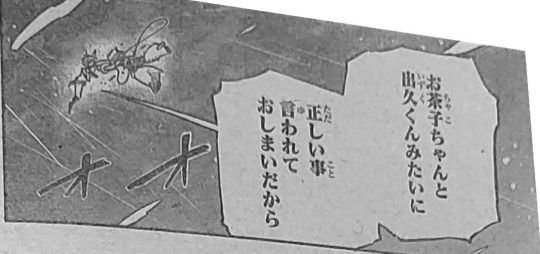
This panel here says:
「お茶子ちゃんと出久くんみたいに正しい事ゆわれて言われておしまいだから。」
The breakdown is as follow:
お茶子ちゃん (おちゃこちゃん) : Ochako-chan
と (to) : and, with, if, when, promoted pawn (shogi)
出久くん (いずくくん) : Izuku-kun
みたいに / 見たいに (mitai ni) : similar to ~, like
正しい (ただしい / tadashii) : right, just, correct, righteous, honest, truthful, proper, straightforward, perfect
事 (こと / koto) : thing, matter, fact, circumstances, business, reason, experience
言われて (ゆわれて / yuwarete) : to have been told (passive form of 言う /ゆう)
おしまい (oshimai) : the end, closing, being done for
だから (dakara) : so, therefore
My translation would be:
"I was told that being like Ochako-chan and Izuku-kun is the right/correct/proper way, that's why I'm through with it."
This sentence can be interpreted in a lot of ways. You are entitled to your own interpretation as much as I am to mine, so don't limit your perception because of this post alone.
To put in more context, Toga utters that sentence right after this page that explains how she couldn't ask her past crush who resembles Izuku, Saito, to give her his blood because he would say that she's not human and he would think she's not cute.
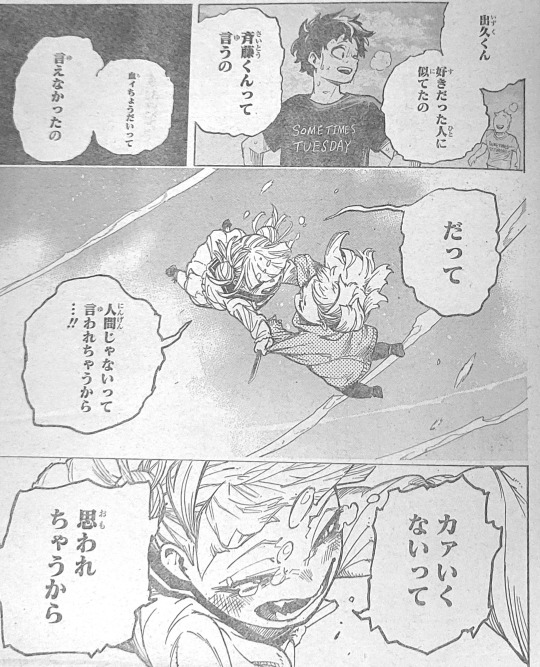
Translation:
「出久くん好きだった人に似てたの。斉藤くんって言うの。血ィちょうだいって言えなかったの。だって人間じゃないって言われちゃうから…‼︎カァいくないって思われちゃうから」
"Izuku-kun resembles the person I used to like. He was called Saito-kun. I couldn't ask him to give me his blood. Because then, he would say I'm not human...!! Because, he would think I'm not cute."
Breakdown:
好きだった人 (すきだったひと / suki datta hito) : The person that (I) liked
に (ni) : particle, in this case, to indicate location of action
似る (にる / niru) : to resemble, to be similar to; the て-form + いた indicates past progressive tense, and い in いた is usually silent in Japanese
って言う (っていう / tteiu) : called
の (no) : feminine speech to indicate emphasis
血 (ち / chi) : blood, consanguinity
ちょうだい (choudai) : a way to make request, indicating familiar relationship
言う (ゆう / yuu) : to say, to call; potential form is 言える; negative potential is 言えない; past tense ending of い-adjectives is ~かった
だって (datte) : because, but, after all, even, too
人間 (にんげん / ningen) : human being, man, person, character (of a person)
じゃない (janai) : to not be (am not, is not, are not), casual form of じゃありません
言われる (yuwareru) : passive form of 言う
ちゃう (Chau) : casual form of ~てしまう; in this case, indicates an event has been completed with negative feelings
から (kara) : In this case >> it means because, since
カァイイ / 可愛い (かわいい / kawaii) : cute, lovely, adorable, charming, pretty; Kaaii is kawaii but with a little lisp
~くない (~kunai) : negative form of い-adjectives
思う (おもう / omou) : to think, to consider, to believe; passive form is 思われる (おもわれる / omowareru)
Toga is opening up to Ochako about her sorrow, and "I was told that being like Ochako-chan and Izuku-kun is the correct way" is her saying how love should be like in society's eye. It's putting love in a box and constricting it in the way that rejects people like Toga, labeling them not "human". Other forms of love that can't be accepted by the "norms" is considered hideous and improper.
This experience of being discriminated against is what the queer community has to face every day. So yes, that line is Horikoshi calling out against heteronormativity through Toga. It further proves to anyone who is still not convinced that Toga's story arc, as a whole, is queer allegory.
It could also be taken as how Horikoshi perceives shonen most cliché ending: the male protagonist always ends up with the female love interest. If memory serves me right, he said something along the lines of not wanting the manga to end like a typical shonen (if anyone has the screenshot of this interview, would you be so kind as to send it to me, pretty please?), so it's not too far-fetched to assume that way. Though, truth be told, I still have doubts that he would follow through with that. So, let's wait and see.
Interestingly, after Toga told Ochako that her expression of love would make her crush think that she's not cute, Ochako chose to keep calling her lovely and cute.
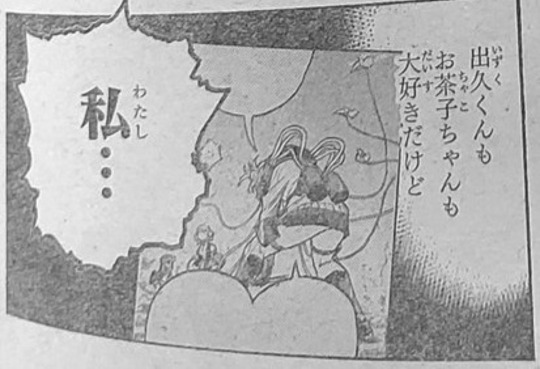
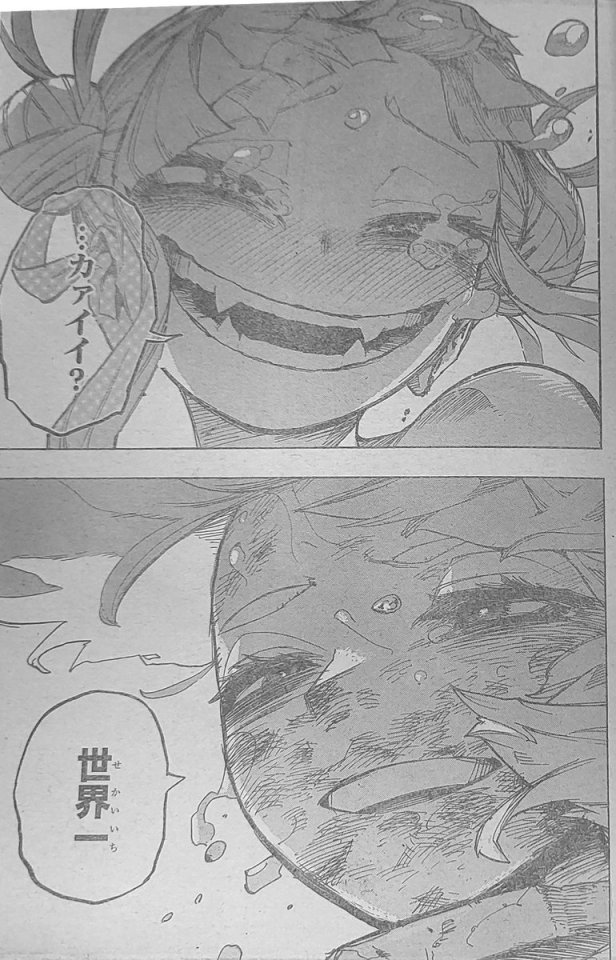
Translation:
Toga:
「私。。。カァイイ?」
"Am I... cute?"
Ochako:
「世界一」
"Number one in the world / the cutest in the world."
Breakdown:
私 (わたし / watashi) : I, me
カァイイ 、可愛い (かわいい / kawaii) : cute, adorable, charming, lovely, pretty (Toga says it with a lisp)
世界一 (せかいいち / sekaiichi) : best in the world
Ochako, bless her heart, understands Toga and everything that makes her her, albeit a bit late. Toga has always wanted acceptance and she gives her that wholeheartedly, symbolized by telling her what she has longed to hear. And it was done genuinely, not just to please her. She remembers Toga always wanted to talk about romance with her, hence she is using that to connect with her. She tells Toga her story, her parents, her motivation to be a hero, her crush on Izuku, and her desire to stop Toga, saying that those are what makes her her.
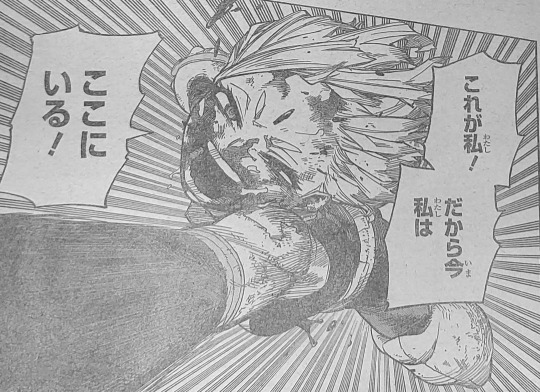
Translation:
「これが私!だから今私はここにいる!」
"This is what I am! That's why I am here!"
Breakdown:
これ (kore) : this; pronoun that's equal to nouns, meaning it can be subject, object, or indirect object
が (ga) : indicates subject
私 (わたし / watashi) : I, me
だから (dakara) : so, therefore
今 (いま / ima) : now, the present time, just now, soon, immediately, (one) more
は (ha, reads as wa) : topic marker particle
ここ (koko) : This place, area, or part
に (ni) : in this case >> location of a person
いる (iru) : to be (of animate objects), to exist
From my understanding, she is saying that her experiences shaped her, therefore she can be the hero she is now, the hero who's fighting for everyone's smile. For that reason, she doesn't fight Toga the way a hero is supposed to fight villains, because she has seen Toga's tears and she hates that. She wants to stop her from crying as much as wanting to stop her from killing the heroes. So, she lets Toga see her the way she is while readying herself for another stab yet doesn't try to defend against it, hoping Toga to understand that she can trust her.
And it works out.
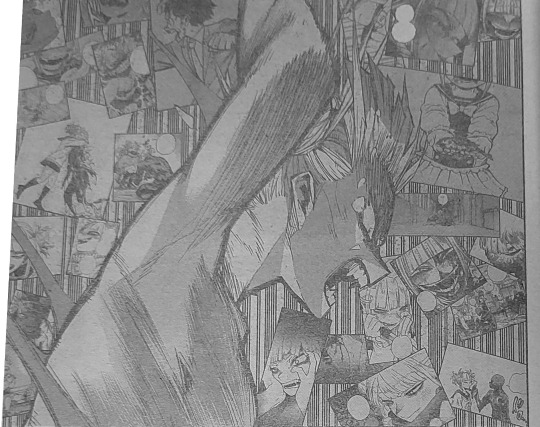
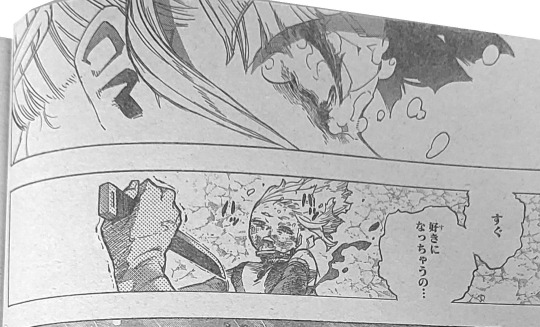
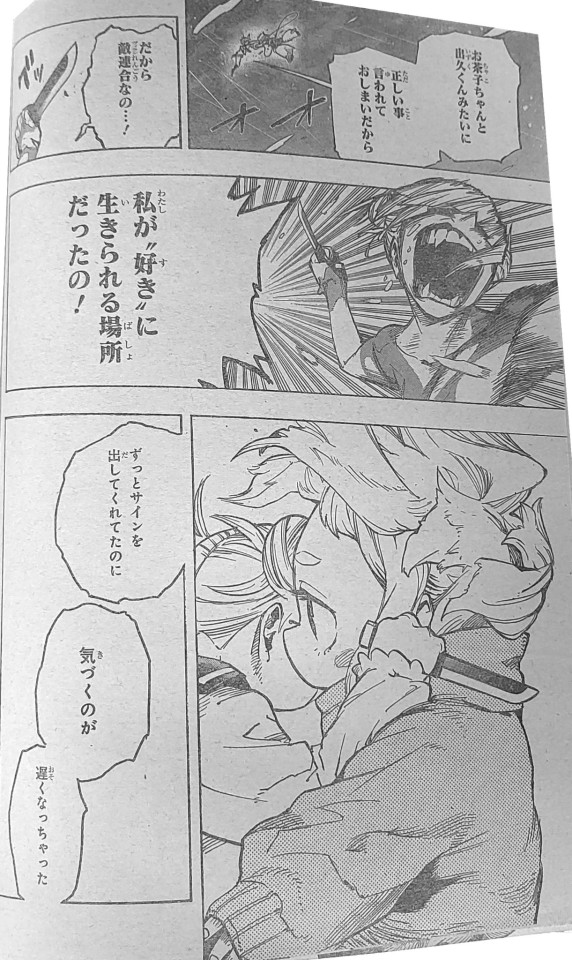
Toga pours her heart out, letting herself be vulnerable in return, letting Ochako to "touch her sorrow" (as she says it). She says she has had enough of how people always told her that the correct way is "to be like Ochako-chan and Izuku-kun", that's why she joined the league of villains since it was the only place where she could live as she "likes".
In response to that, Ochako expresses her regret.
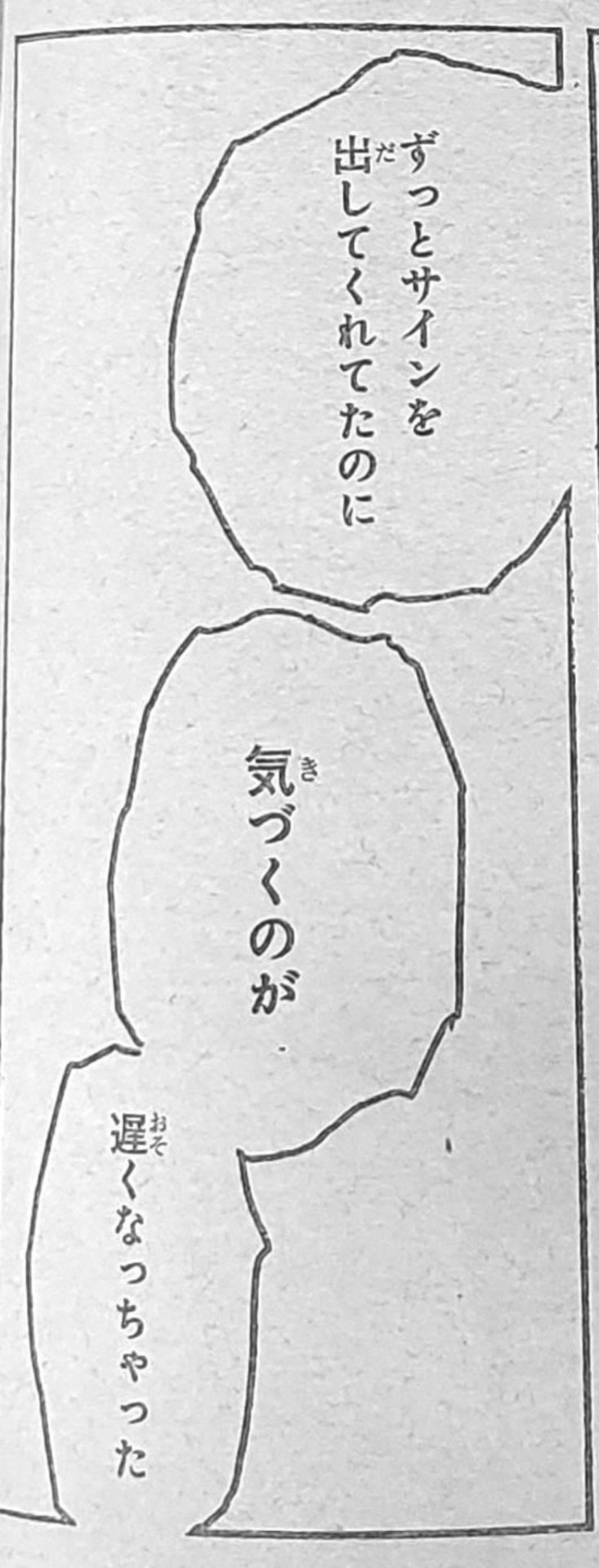
Translation:
「ずっとサインを出してくれてたのに気づくのが遅くなっちゃった」
"Even though you've been giving me signs all along, I noticed them too late."
Breakdown:
ずっと (zutto) : continuously in some state (for a long time, distance), throughout, all along, the whole time, all the way
サイン (sain) : In this case >> sign
を (wo) : indicates direct object of action
出す (だす / dasu) : to send, to submit; ~て form is 出して
~てくれる (~te kureru) : to express something was done for you
~ていた (~teita) : past progressive tense
のに (noni) : in this case >> although, in spite of, even though
気づく (きづく / kiduku / kidzuku) : to notice, to recognize, to recognise, to become aware of, to perceive, to realize, to realise
の (no) : nominalizer >> if attached to verb, the verb is treated like noun
が (ga) : indicates subject/object
遅くなっちゃった (おそくなちゃった / osokunachatta) : show, (to become) late, too late; ちゃった is the past form of ちゃう, which is the casual form of ~てしまう (used to indicate that an action or event has been completed, often with unintended or undesirable consequences)
What's even more interesting is that she also says this.

Translation:
「敵連合の代わりにはなれないけど…あなたの笑顔が素敵だと伝えなきゃと思ったの」
"I can't be a substitute for the league of villains but... I thought I have to tell you that your smile is lovely."
Breakdown:
敵連合 (ヴィランれんごう / viran rengou) : league of villains
代わりに (かわりに / kawari ni) : instead of, as a substitute for, in exchange for, in return for; ~の has to be attached if it's noun
なる (naru) : to become, to be, to play a role; potential + negative is なれない
けど (kedo) : but, however, although
あなた (anata) : in this case >> you
の (no) : in this case >> possessor
笑顔 (えがお / egao) : smiling face, smile
が (ga) : indicates subject
素敵 (すてき / suteki) :lovely, dreamy, beautiful, great, fantastic, superb, cool
だと (dato) : from ~であると, used to nominalize the quotation clause
伝える (つたえる / tsutaeru) : to convey, to tell; attached with ~なきゃ, short for ~なければ, which is used to convey "must", "have/has to"
~と思う (~とおもう / ~to omou): to think, I think; past form is ~思った
Since we know that the league of villains is like a safe place for Toga, Ochako's wording makes it sound like she wants to be someone whom she can express her love freely to, someone whom she can be herself with. With this sentence, added with how Toga has expressed her love to her many times and how words like "cute" and "lovely" symbolize acceptance to Toga, Horikoshi wants the readers to know that Ochako doesn't shy away from Toga's feelings.
I remember seeing this quote, "Love is when you give someone else the power to destroy you, and you trust them not to do it", and think that it really fits them so well and perfectly. So, I think that whatever ending Horikoshi may have for them, it won't negate the love, in whichever form, they have for each other.
43 notes
·
View notes
Text
love stories with some genshin boys i thought of while listening to my playlists
includes: aether (210 words), xiao (261 words), scaramouche (277 words) and albedo (307)
warnings (?): spoilers of ‘we will be reunited’, english is not my native language and uhh idk what else, idk really know what these are, headcanons ?? snippets ?? also not beta read and not edited.
it’s long so uhhh i’ll add a cut somewhere
anyway enjoy!! ...whatever this is i guess

Aether
Falling in love with Aether is like a fun adventure. He, being always the center of attention and the protagonist no matter where he goes, is a free spirited, kind and hardworking man.
Throughout your time travelling and being in a relationship together, you’ll find that your relationship with the Honorary Knight is one of sweet kisses under the sunlight; innocent handholding while thinking up of what to make for dinner tonight; of easily talked out arguments and finding ways to compromise; of softly pushing each other to become a better version of themselves and, most of all, of supporting and having each other’s backs no matter what.
And when Aether confronts the Abyss Princess face to face for the first time and his world comes crashing down on him, this trait of your relationship shines like no other, as you hold him in your arms after everything was over during the night, Paimon sleeping soundly next to the both of you inside your improvised campsite.
“Even though I’m not sure what -or who- I should believe anymore, I... I know I want to see this journey to the end, and I want you to be there with me for it. Let’s be together until the last moment and beyond.”
Songs:
Snow Fairy - Funkist
Snowing, be honest with yourself and smile When two people are getting closer, time overlaps Fairy, where are you going I will gather all the light and shine it on your tomorrow
Still Lonely - SEVENTEEN
This cursed popularity. Why won’t it leave me? But why am I getting lonelier The early morning chill makes me feel Even lonelier today I feel completely empty, as if I’m empty
Kanpeki Gu~ no ne - Watarirouka Hashiritai
I'm at a loss for words, with this and that, I'm totally in love with you Someday, I want do the same to you: Watch you flounder, At a loss for words right back to me!
Side by Side - The8 from SEVENTEEN
I want to hold hands with you but I don't know what to do what to do oh baby I want to give all my heart to you but You still don't know what's in my heart
Hope - Namie Amuro
At the end of this blue, wide world there's a place I want to aim at with you We chose this long ago for eternity

Xiao
Falling in love with Xiao is like living a bittersweet dream. The Vigilant Yaksha is far from human, or so he says, and thus is out of touch with the way we mortals experience feelings, both the negative and positive ones.
Your relationship with him is one of compassion, mutual understanding, appreciation and patience. So, so much patience. Of intertwined pinkies and soft stolen glances, of shy smiles and comfortable silence sometimes filled with your voice chatting time away and his short responses to your talks.
I mentioned patience. He knows you’re making an enormous effort to try and understand him and be patient with him and his slow learning process of how relationships work, so it’s only fair that he makes a true effort to understand you and your feelings.
Xiao is well aware that he could hurt you without wanting to, be it with his blunt phrasing of his thoughts or his Karmic Debt, as much as he is aware that you will eventually pass away and leave him behind to go somewhere he can’t follow, and that undeniable truth haunts him every second of every day he gets to spend with you. And still, he wishes and wants and does cherish each and every warm, kind feeling he gets every single second you’re together nonetheless.
“I might not know what to make of these new feelings you gave me. But I’ll learn. I promise I’ll learn, so please... don’t go, not yet. Let me treasure you and carve you into my memory for as long as I can.”
Songs:
Euphoria - BTS
I don't know what this emotion is Perhaps this is also the inside of a dream A dream is the blue mirage of the desert Deep inside of me, a priori I become happy to the point of being unable to breathe The surroundings, bit by bit, become clearer
Fallin’ Flower - SEVENTEEN
While flower blooms and falls, scars cure and buds shoot We are living our first and last moment So I won’t take you for granted Because you loved me as I am
Fear - SEVENTEEN
Get out my mind I can't handle it, I'm afraid of myself The truth has me tied up My heart is tainted I'm afraid it'll eventually change you too
The Truth Untold - BTS, Steve Aoki
It’s my fate Don’t smile to me Light on me Because I can’t get closer to you There’s no name you can call me
You know that I can’t Show you me Give you me I can’t show you a ruined part of myself Once again I put a mask on and go to see you But I still want you
Tiny Light - Akari Kitō
Because you colored my unchanging monochromatic days Even the blurred darkness gained meaning
Still, hidden in this heart, these feelings of preciousness so strong that they hurt I just want to convey these feelings to only you before they disappear someday

Scaramouche
Falling in love with Scaramouche is like constantly playing a game. He’s strict, demanding, disagreeable, and widely disliked by enemies and allies alike. Still, he has a heart too; and he holds desires and hopes deep inside of it, although most of them are fueled by the unchanging curiosity he has towards the world around him, curiosity to know what he can get out of whatever the world wants to throw at him.
You were no exception to that rule, at first.
When he met you he wanted to get something from you. And you knew it from the start, just as he knew that you knew. And that didn’t change anything, at first.
Your relationship with him is one of dangerously playful, yet still light-hearted games of seduction, teasing and deceit; of secret kisses exchanged in expensive private rooms in restaurants or the cozy warmth of your home, of an unspoken shared respect and, most of all, complete, mutual devotion.
You know Scaramouche is not a good man. He has done many, many unspeakable things in his life as one of the Eleven, and he knows he’s far from being the perfect charming prince you could aim for, but he will never let you go. Because behind those hardened walls of egocentrism and pride, you saw what no one else bothered to see. You saw him, not the role he was playing, you saw him and fell in love with him.
“To be honest, I don’t think I could find anyone else who understands me as much as you do. And no, I’m not saying this because I want something, give me some more credit, geez...”
Songs:
soldier game - µ’s
You'll come with me, yes? You've grown curious about my touch, yes? Then it's already love Since you're someone I must meet in battle someday, That might just be your reason It's soldier game Though we've met again, I'm soldier heart
Kowareyasuki - Guilty Kiss
Just stop it already and show your heart only to me I love your eyes that are about to cry And your defenseless, clumsy way of living too (...) The hesitation you convey makes my chest hurt Some people just don't know what such kindness is But then I discover the truth When we got together, you don't have to endure anymore Right now, show your grief only to me I like that you think too much The complete opposite of me
Shhh - SEVENTEEN
Don't think of all these as your mere illusion They're not lies that follow the moment No one can underestimate it, my feelings are an ignition 'Cause I'm always the same Me and you, we got hurt by the lies that we won't ever work But it's fate
(...)
So I can cover you from danger A consented dedication
(...)
It's as natural as breathing An everlasting dedication
Good to me - SEVENTEEN
Yeah, when you were making that sign in my heart It was a long time since my firewall broke down Pass with the password What in the world do you know about me? Are my deep feelings seen by you?
Hiraishin - Keyakizaka46
(To trust is to be betrayed, to open one’s heart is to get hurt So to avoid being struck by lightning-like sorrow…)
Which side am I picking? Ah, these values are hard to handle That’s why I won’t stop watching over you Positive positive positive You should just be yourself… I can forgive whatever absurdities you pull off I’ll support you without being noticed Even when you get nitpicked I’ll be your companion Let us now promise to live an unremarkable life hereafter What we have here is the lightning rod of love

Albedo
Falling in love with Albedo is a fairy tale-like experience for both of you. His attention had always been focused on his research, everything else fading into the background save for a few exceptions, until you came around. You, who stole all his attention by just existing.
As an alchemist, he’s naturally the curious type. He wanted to know what about it had caught his attention, what was so special about you that had him clinging to your every word and movement every time you interacted with him. Still, human relationships are hard for him, and he figured you might go away the second he started to feel burnt out from your interactions. But you didn’t. Instead, you stayed. You stayed and took interest on what he did, asked questions, gave your insight, and dragged him to sleep when he needed a break. In exchange, he did the same for you.
Your relationship with Albedo is like one of those awkwardly sweet first time crushes. Of carefully calculated movements, dates and compliments, of soft kisses on lips, hands and cheeks, of mutual support, understanding and mature compromising and commitment.
The Kreideprinz, like everyone else, has his own fears and insecurities, especially regarding his... nature, but he does his best not to let them affect the relationship he has with you. Each moment spent by your side, even when he’s not actively doing any research, is considered perfectly spent, meaningful time.
“A long time ago, I was tasked with finding out the meaning of this world. Though I have directed my efforts and resources to looking for the answer through alchemy, ever since we met I... think, I’ve found an unexpected conclusion to said issue. While it’s likely that this is not the answer expected from me, I’m positive that, at least personally, I finally have the answer.”
Songs:
Futari Saison - Keyakizaka46
In the wind blowing through the city’s streets, even though I caught whiff of something’s scent, I had no interest in looking back
In a 1m radius around me, I formed an invisible barrier to another world And yet, you took someone like me out of it
What made you do that?
Home - SEVENTEEN
What can I do? Without you I’m just an old robot, my heart stops and it’s always cold What can we do? Without me You’ll struggle just as much, so what can we do?
Baby, I want to cherish our warmth So no one can come between us
Flower - SEVENTEEN
You taught me, you showed me You’re my only reason If you can forever remember me I can get hurt, I can get hurt
My heart that’s engraved with your light Makes me stronger Give me your sharp thorns Cause you’re my flower
Oh my! - SEVENTEEN
Sorry for repeating the same thing But this is all I can try using hard words But my true feeling is this, every everything
(...)
How about you? Is it hard for you to sleep because of me too? If you keep making my heart flutter What do I do?
Naze koi wo shite konakattan darou? - Sakurazaka46
Why hadn't I fallen in love? I've been making fun of it all this time I mean everyone keeps saying 'I love you' just like cats in heat But after falling in love I realized what people live for To meet, to love, to the point of nothing but... I'm not myself, I want to find my true self.
#xiao x reader#aether x reader#scaramouche x reader#albedo x reader#genshin x reader#genshin x y/n#genshin impact headcanon#genshin imagines#genshin impact imagines#first post yay#why is albedo's so long tho he's not even my favorite out of them lol#melodywritings#fluff#genshin impact x reader#melwritesgenshin
197 notes
·
View notes
Text
Van Zieks - the Examination, part 12
Warnings: SPOILERS for The Great Ace Attorney: Chronicles. Additional warning for racist sentiments uttered by fictional characters (and screencaps to show these sentiments).
Disclaimer: (see Part 1 for the more detailed disclaimer.) - These posts are not meant to be taken as fact. Everything I’m outlining stems from my own views and experiences. If you believe that I’ve missed or misinterpreted something, please let me know so I can edit the post accordingly. -The purpose of these posts is an analysis, nothing more. Please do not come into these posts expecting me to either defend Barok van Zieks from haters, nor expecting me to encourage the hatred. - I’m using the Western release of The Great Ace Attorney Chronicles for these posts, but may refer to the original Japanese dialogue of Dai Gyakuten Saiban if needed to compare what’s said. This also means I’m using the localized names and localized romanization of the names to stay consistent. -It doesn’t matter one bit to me whether you like Barok van Zieks or dislike him. However, I will ask that everyone who comments refrains from attacking real, actual people.
Part 1 Part 2 Part 3 Part 4 Part 5 Part 6 Part 7 Part 8 Part 9 Part 10 Part 11
Let's bring this thing home! It's time for the conclusion of the essay series!
Conclusion With a stupidly long essay series behind us, it's time to look at what we've learned! Let's go back to Part 1 and review what we needed from Van Zieks's character development for a fully rounded redemption arc, shall we?
1) Present an antagonistic (possibly immoral) force who personifies Ryunosuke’s biggest personal obstacle/weakness, in this case racial prejudice. 2) Humanizing traits begin to show. OPTIONAL: A backstory to justify any immorality he has. 3) Over time, Barok has his realization and sees the error of his ways. 4) Barok atones for his immorality, not simply through apology but by taking decisive steps. 5) The cast around him acknowledges his efforts and forgives him.
And looking at the main game (plus additional dialogue), we have...
1) Antagonistic force:
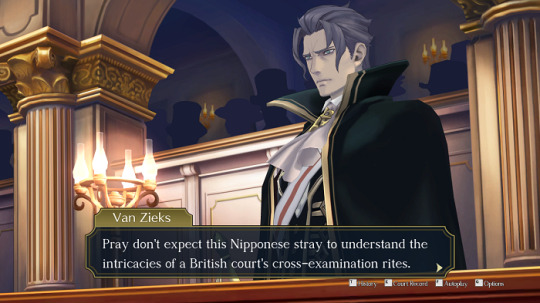
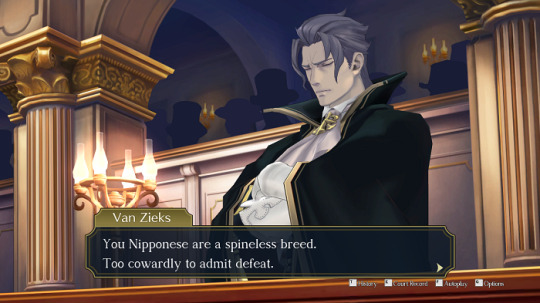
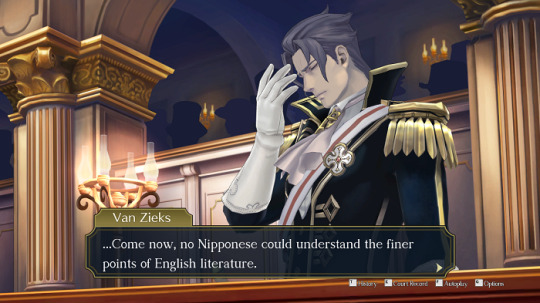
Etc. etc. I have many of these. We can all agree that as an antagonistic force, he does his job quite well. CEO of Racism and White Privilege in the flesh. It works, since we as the audience get very frustrated and want to see him defeated.
2) Humanization:
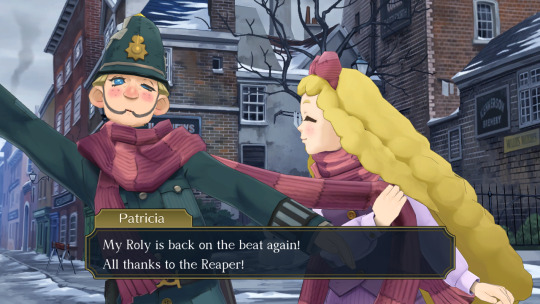
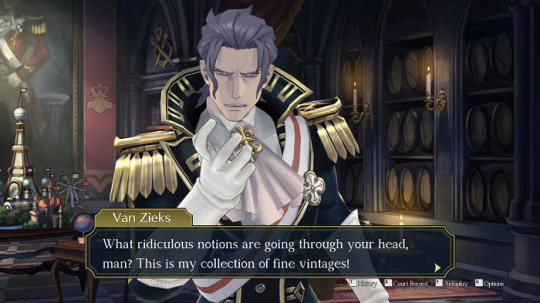
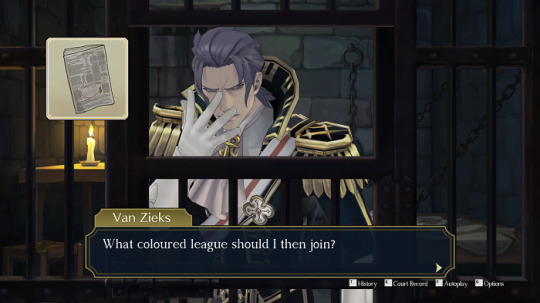
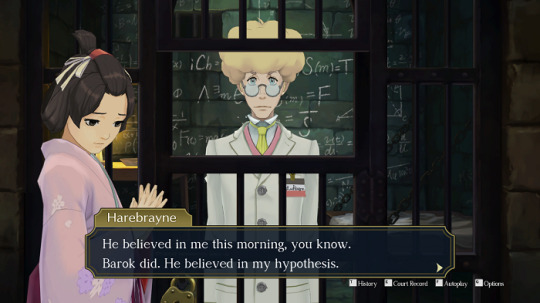
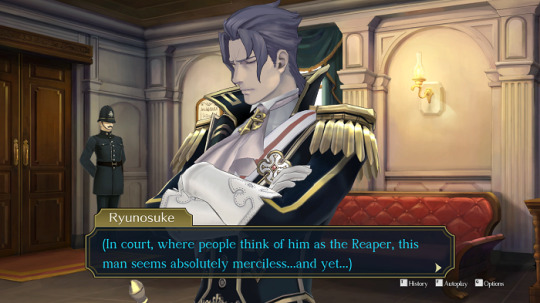
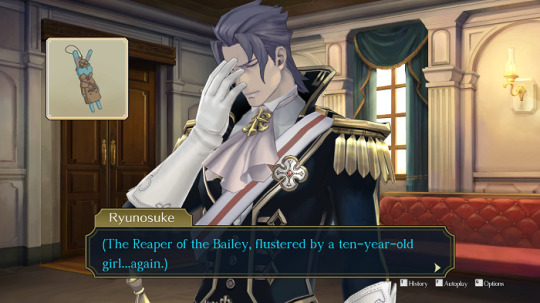
Giving him an old friend to be a defendant was a brilliant move, really. Albert's reflection on the friendship and the person Van Zieks used to be really helped flesh him out and make him appear more like a human being with, y'know, emotions and weaknesses. The little snippets of dialogue in his office really help too. Presenting evidence can also lead to fun tidbits. All in all, considering how gruff and distant Van Zieks is, they really did their very best to humanize him. The writers were given very little to work with but they exploited every opportunity to come their way.
OPTIONAL backstory:
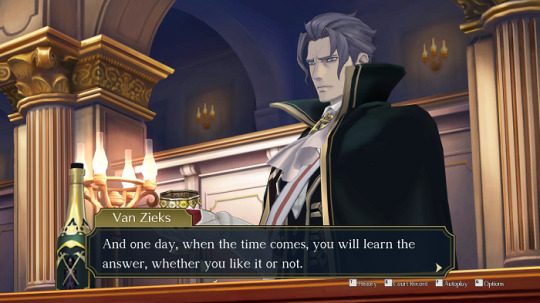
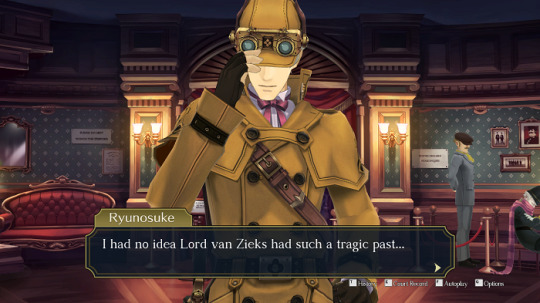
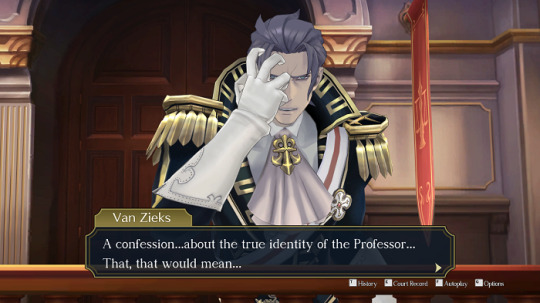
Again, I don't think we needed a tragic backstory to have a well-rounded, redeemable character. Still, it ties in very expertly to the game's plot and the motivations of quite a few other characters. The story of Klint van Zieks and his death isn't necessarily Barok van Zieks's backstory, it's the center of an intricate web which also holds Kazuma, Stronghart, Gregson, Jigoku, (S)Holmes, Mikotoba, Sithe, Drebber- I could go on. A LOT. So because of how very integrated it is into the main narrative's recurring themes and characters, I'll give it props for being relevant and well thought out. The bigger question is: Does it justify his immorality? Not entirely. I think the game could have gotten more out of this if they'd involved the other two exchange students in this tale just a bit more. They could have given more attention to how Jigoku's aggressive behavior in the trial impacted Van Zieks, and explained whether he might've suspected Mikotoba of sabotaging (S)Holmes's investigation. If the narrative had done that, all three Japanese people to come to London would have been ‘the bad guy’ in Van Zieks's eyes and it would have given more credence to his racial generalization. They could have also given more attention to how the people around him reacted to Genshin being the Professor, because I'm sure Stronghart and Gregson stoked the fire in terms of xenophobia. As it stands, there isn't really enough there to justify hatred of an entire race as opposed to just one person.
3) Realization/Redemption
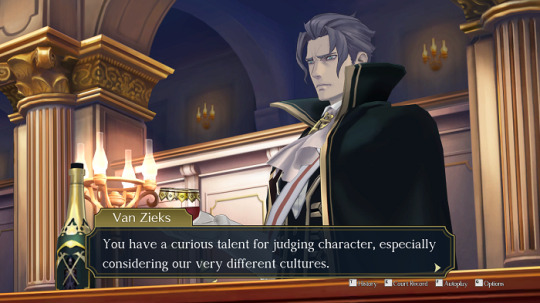
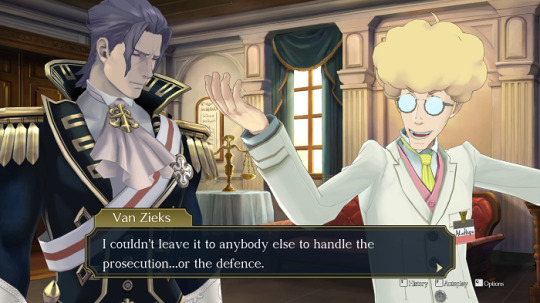
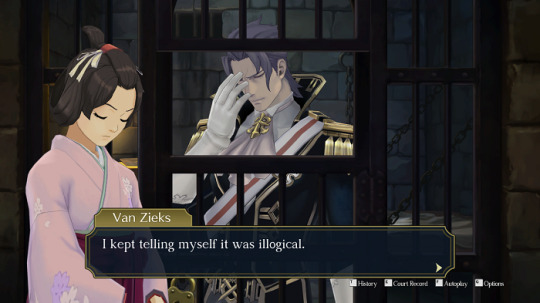
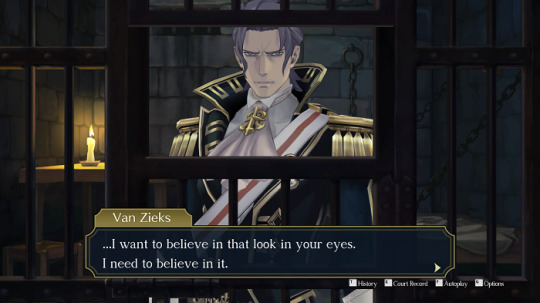
We see him already start to realize the error of his ways around the end of 1-5, which is technically only about halfway into the full narrative. Unfortunately, thanks to 2-2 being played afterwards (but chronologically set before 1-5), any progress made in 1-5 can become invalidated in the player's eyes. Growth works best when it's done linear. Don't get me wrong, flashbacking to earlier times when a character is still more morally tainted can work well, but it needs to be executed properly. Barok's behavior in 2-2 is downright insulting towards the audience itself and therefore, it causes emotional friction when relaying the narrative endgoal of redemption. It also makes it extra jarring when we hit 2-3, and suddenly Van Zieks is meant to be relying on the protagonist's desire to expose the truth. How on earth can we as the audience trust that Van Zieks believes in Ryu's abilities when we just came fresh out of a case where this man actively sabotages Ryu's efforts?
Still, the line of redemption continues from 2-3 into 2-4 well enough. He admits that he was wrong- that his hatred was illogical and that he needs to change. This is the very definition of redemption. I need to stress once more this is not to be confused with atonement, which comes next.
4) Atonement
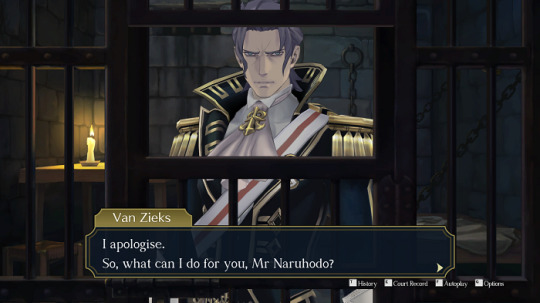
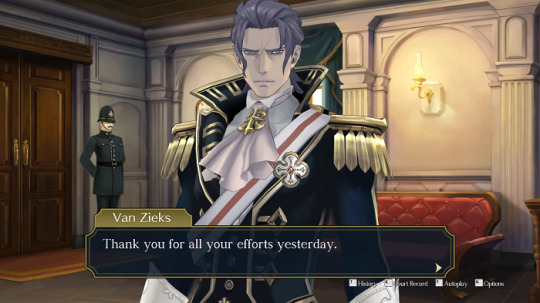
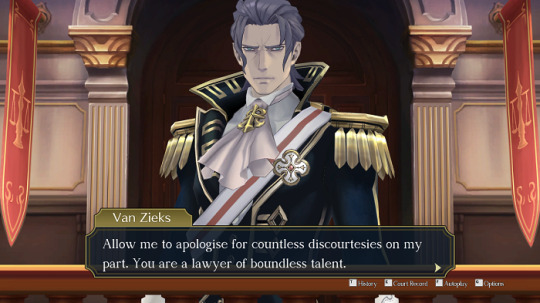
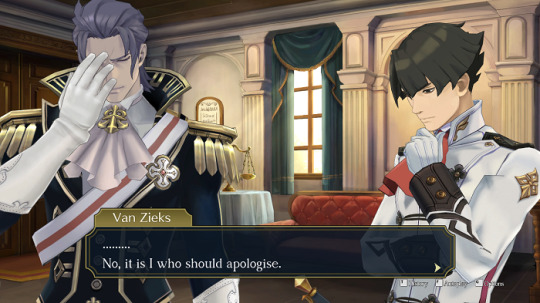
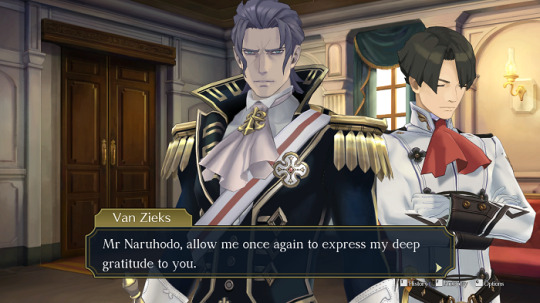
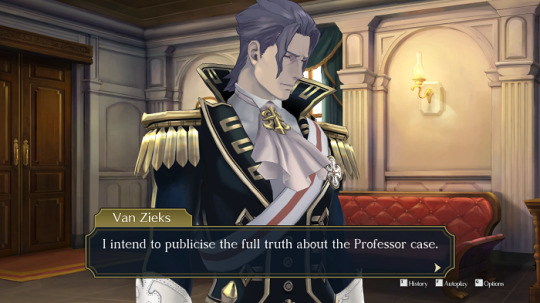
Here it is. It's not enough to simply acknowledge mistakes; one needs to work hard to fix them. Since Van Zieks is the defendant for two whole episodes, equaling roughly 20% of the full narrative and 67% of the time following his first true realization (chronologically), there isn't much that he can actively do to atone. Because remember, not only do these actions need to fit the situation he's currently in, they need to fit his personality. These two limitations ensure the atonement mostly takes the form of dialogue. Of apologies.
One might want to point out that he never apologizes specifically for his racism, but there's a reason for that. If you pay close attention, you'll notice that there isn't a single character who ever uses a word like “racism”, “xenophobia” or even “racial prejudice” in this game. It's for the same reason you'll never see an Ace Attorney character utter words like “alcoholism”, “drug abuse” or “depression”. These things may be implied very strongly, to the point where you'll know for certain a character is suffering from it, but it's never given these exact labels. It has to do with the tone of the game. In Great Ace Attorney's dialogue, Barok van Zieks is only ever described as holding “a deep hatred for Japanese”, which is then the only thing he could apologize for. And he does, so long as you aren't looking for a literal phrasing of “I apologize for my deep hatred of your people”.
Regardless, he can't take more active, decisive action until he's freed from prison and two scenes with Van Zieks later, the game has ended. He still manages to take two actions, though! The first is to publicize the truth of the Professor, taking the blame of the mass murders off Genshin's shoulders (and losing his own privilege in the process). The second is to take Kazuma under his wing as his disciple. I'm not certain there's anything else the narrative could have had him do. What is decisively missing, however, is the following:
5) Acknowledgment
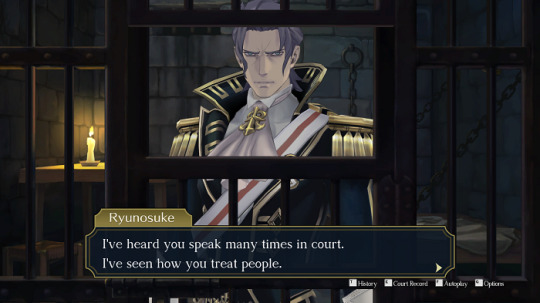
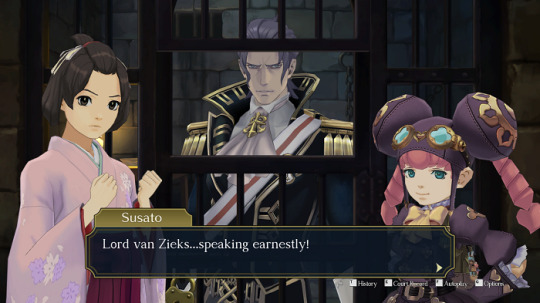
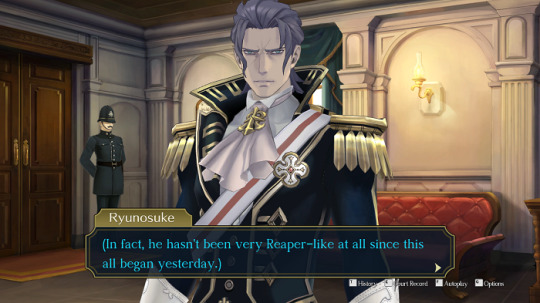
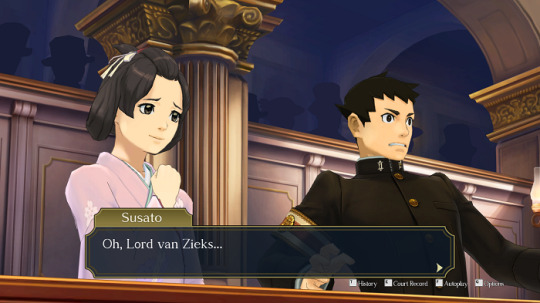
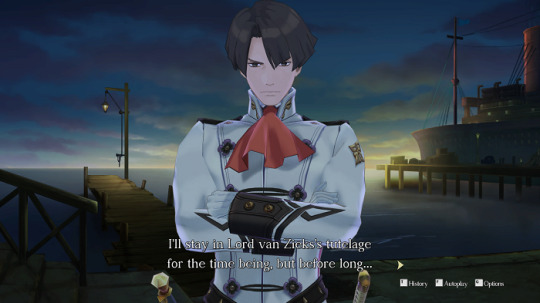
The above aren't good examples of cast acknowledgment that Van Zieks is taking part in a redemption arc, rather, they're the best I could find. Characters are acknowledging that he's changing- that he's being kinder to them and they can get along with him now, but they're not acknowledging that he caused hurt in the first place. This, in my opinion, is the Great Ace Attorney's biggest narrative flaw. I've talked before about how Ryu's reaction to Van Zieks's racism is 'indirect communication', a typically Japanese manner of dealing with negativity. I've also talked about how Ryu is not in a position to speak up, as he's a literal minority who is there to represent his country in an official capacity and can’t afford to make enemies. However, characters like Susato and Kazuma are far more outspoken in their opinions, as is Soseki. The only one who ever calls Van Zieks out on his racism is the British judge, and even that is done very meekly. When an old crusty white guy is the one who condemns white privilege in a cast full of minorities, you've got a problem. The Japanese cast's refusal to acknowledge that Van Zieks's words were harmful is like Team Avatar telling Zuko that sure, he can join since he's a good guy now, but never once acknowledging that he burned down villages or betrayed everyone's trust in Ba Sing Se. There's something very vital missing, see? If indeed the cast had called Van Zieks out more actively on his harmful ways and how necessary it was for him to change, he in turn could have taken more atonement steps in response.
So, for the conclusion: Does Barok van Zieks tick all the necessary boxes for a complete redemption arc? Yes. In a very technical sense, all the requirements are there. But does that mean it's a successful arc? Not necessarily. The game has a few slip-ups, a few things not executed as well as they could have been. For that reason, whether the audience is satisfied with the arc is entirely up to them. Taking into consideration that they had to cram a whole lot of story into just two games- the second game in particular, I can acknowledge they did their very best with the limitations that were there.
And there we have it! That’s all I could think to say on the matter. I hope everyone who read this till the very end enjoyed it, maybe even learned a thing or two. I’m always open to questions, input and constructive criticism!
#dgs#dgs spoilers#tgaa#tgaa spoilers#barok van zieks#I'M FREE!#well until I tackle the DLC content#but until then...#FREEEE
44 notes
·
View notes
Text
Loki (2021) Positivity from an Anti
Ok so all of my mutuals know I’m extremely anti-Loki (2021), anti-sylki, and anti-sylvie. But at a certain point, even we antis get tired of all the negativity. So! Here’s some Loki series commentary in the opposite direction! This is a list of all the things about the show that I loved :)
Also adding a disclaimer that all of this is just my opinion and some of my fellow antis (or even people who liked the show) might disagree, and that’s fine! I’ve been planning this post for awhile. I always say in my other posts that I don’t entirely hate the show and I wanted to be a little more specific about what I think are its good aspects. Feel free to leave your thoughts!
• Mobius is a gem (Owen Wilson owns my whole heart) and his relationship with Loki is so so great. He’s not one-dimensional at all, he has conflicted loyalty and is morally complex, and he has the tragic backstory- which makes him a perfect choice for eventually becoming Loki’s first genuine friend.
• The casting was really really great. Lots of women and people of color. Most of the female actresses (as well as the males) are over 30, which isn’t very common and is fantastic!
• Superb acting all around. I can’t think of a single scene where the actors under or oversold it.
• Beautiful set design, incredible cgi, and gorgeous cinematography overall. It looked more like a movie than a tv show, which is really good.
• Kang being the big bad was a huge plus for me. Johnathan Majors was perfect in the role, his vibes were immaculate, and I was honestly pretty worried that the man behind the curtain would end up being another Loki variant, which imo would’ve been boring and predictable and counter-productive, so it was a big relief when that didn’t happen.
• I like that it sets up a bunch of future marvel movies, rather than being contained to its own little world. It gives it more importance and (hopefully) will encourage writers to not just toss Loki’s character aside in future projects.
• All the Loki variants were delightful. All of them except Sylvie. Kid Loki has my heart. Boastful Loki is a fashion icon. Alligator Loki is a savage. President Loki is the superior variant. Classic Loki became my fav character in less than half an episode.
• It showed some more variety in Loki’s magic. A lot of his powers we’ve seen before, but it feels like they were portrayed a bit more blatantly in the show. The energy blasts, the telekinesis, the teleportation… Outstanding.
• It also implied that Loki has the potential to be waaaay more powerful than he knows he is right now, which? Yes.
• Some of the quotes- and the themes behind them- are just profound as hell. Such as:
“I think we’re stronger than we realise.”
“It’s never too late to change.”
“You can be whoever you wanna be, even someone good.”
“We’re Lokis. We survive. It’s what we do.”
“Loki, God of Outcasts.”
“The universe wants to break free, that’s why it manifests chaos.”
• Technically Loki was Marvel’s first canon lgbt (bi) character, which is a win. His genderfluidity is also technically canon, even if it wasn’t really acknowledged on-screen.
• There were a lot of throwback references to Thor 1, Avengers, and Thor The Dark World. Which I loved.
• Sylvie’s so pretty. Her hair and makeup and costume were all perfect.
• Big fan of Loki finally getting Laevateinn.
• Sufficiently slutty imagery, courtesy of a female director (Loki in a collar, kneeling to Sif, President Loki looking down into the bunker, the hair flips)
• The music was Excellent Wonderful and Superb.
• I love that Loki being a good singer is now canon.
• I love that Asgardians having their own language is now canon (even if it’s basically just Icelandic).
• I also love that they disproved all of those “Loki was a shy nerdy wallflower pre-canon” theories in Episode 3. The drinking/eating/singing scene was fun, if a bit wacky.
• There’s a million different reasons why Loki does what he does, especially in regards to the New York attack (I’m literally writing a huge meta on them), but somehow I never considered that Loki being desperate for control was one of them. It makes a lot of sense, and I always love getting new insights into his motivations.
• I love that Loki finally outright acknowledged that he doesn’t enjoy hurting people. We Been Knew™️ but it’s still nice to hear it out loud from his own mouth.
• The TVA outfit wasn’t as hideous as some people make it out to be. It could’ve been A Look, even. You know, if he’d just accessorised a little better. And kept the jacket on. And not gotten sweaty. And not gotten dirty. And maybe had at least one other costume change… But it had potential, though!!
• Even though I despise the Obvious One, I did actually like some of the other romance crumbs they tossed us (sifki, Loki x the flight attendant).
• The whole DB Cooper thing was iconic idc idc.
• Loki’s hyper sort of overly excited puppy attitude in episode 2 was actually pretty refreshing and funny (for awhile). And now I can headcanon him as adhd, yeehaw.
• “We’re all villains here.” That quote was iconic, my favourite one in the show. And the entire theme that it summarised was really great as well. When you think about it, every single main character in this series has been the villain at one point or another. I mean, I know all marvel characters do bad things etc, but none of the Heroes are ever narratively categorised as Bad. This show did just that with all of them, though. . Loki was framed as the psychopath that attacked New York. Sylvie was framed as the murderous fugitive. The TVA/Ravonna/Mobius were framed as the murderous fascists. Kang was framed as the crazy totalitarian. It’s made clear that all the Loki variants were the villains of their stories.
However, every single main character in the series is also framed as the Hero at a certain point. Loki is framed as the main protagonist who throws a wrench in the TVA’s dastardly plans. Sylvie is framed as the persevering freedom fighter who wants to take down the fascists. The TVA/Mobius/Ravonna are framed as the ones who maintain order for the greater good. Kang is framed as the weird but ultimately benevolent wise man who’s just trying to prevent something worse from happening. The Loki variants are framed as generous allies who befriend the main character and help him on his journey.
Everyone in this equation is openly acknowledged by the narrative to be morally corrupt, but not entirely morally bankrupt. There are no Straightforward Hero Figures (like the Avengers) in this entire scenario at all, and that makes for a super interesting dynamic that marvel has never done before. So yes: “We’re all villains here.” But also: “No one bad is ever truly bad, and no one good is ever truly good.” I loved that.
• Even if it wasn’t really enough imo, I still treasure the crumbs we got of Loki being competent and capable (him putting the collar on B-15, him figuring out Sylvie’s hiding place, him teaching himself to enchant on the fly while fighting a giant cloud beast of eldritch proportions).
• I love that B-15 was the one who stepped in and saved the day in Episode 4, when we all thought it was gonna be Mobius. What a queen.
• Marvel usually has a bit of a problem with creating compelling and memorable side characters. But aside from Sylvie, I genuinely got attached to every single character in this show. Like Casey, C-20? I was seriously emotionally invested in them and they were only in like 2 episodes. Wtf.
• Introducing the TVA storyline in the Loki series specifically was a really good move. I’m not saying they executed it well, just that it had a ton of potential. A lot of people have wondered why marvel even thought to put those two (the TVA and Loki) together, when they had literally nothing to do with each other, nothing in common, and essentially no connection at all. But when you think about it, it’s a really interesting twist on both of those stories. Forcing the embodiment of destructive chaos and the pillar of rigid order to interact could make for some seriously entertaining and compelling television. And as far as meshing these two completely unrelated entities together goes, I thought they did it pretty well- at least just the bare bones of the story (loki being arrested by the TVA and being one of their most common variants).
So that’s it! If you guys (fellow antis) wanna add stuff you liked, feel free. If anyone wants to discuss (or debate) my list, feel free to do that too!
35 notes
·
View notes
Note
Can you explain the appeal of Julian Blackthorn? This is a genuine question because I read the books and came away utterly bored by him and unconvinced of his moral greyness as opposed to like, Adam Parrish’s. He seemed so one dimensional to me but I want to know if I’m Wrong TM considering I tend to be very very biased toward my favourite characters and bored by the rest, and my favourites were Mark and Kieran. So maybe I just didn’t pay him enough attention??
it’s been a while since i wrote any earnest tsc meta but cringe culture is dead and the chance to infodump about my julian thoughts has me vibrating where i’m sitting so. yes okay.
technical stuff
(aka: things pertaining to How The Story Is Constructed)
cassandra clare’s characterization has become much stronger just in general since she first began writing the series like twenty years ago
perhaps most importantly: the more recent stuff i’ve read from her has involved characters who actually grow, change, and learn from their past mistakes
rather than repeating the same stupid decisions over and over again
and over and over and over some more
seriously take a shot every time someone in tmi miscommunicates or self-destructs in ways They Have Learned Not To Do for no real reason. u will die of alcohol poisoning
in tda this shines ESPECIALLY with the evolution of mark, kieran, and cristina’s relationship, but that’s a separate post
clare’s trademark is also the angsty traumatized jerkass love interest with a secret heart of gold
the woman is almost singlehandedly responsible for draco in leather pants and the proliferation of this kind of character type in fandom and teen lit. this isn’t a criticism it’s me marveling at how if you commit hard enough to a single trope you truly can change the world. follow your dreams
sad jackass with a heart of gold isn’t an Inherently Problematic Character Type
but poorly done it can lead to relationship dynamics in which one partner is constantly being hurt by and then forgiving the other despite them making no real effort to change, because they are narratively absolved due to being sad
(there’s a lot of this with earlier jace content. in some ways i think will was later created specifically to be a same-archetype protagonist who actually does get called on his shit and grow. that’s also another post)
also if all of your sexy male love interests are tortured jackasses with a heart of gold then people start calling you a one-trick pony
enter julian blackthorn!
from the very start everything about him is designed to be the INVERSE of the heart of gold jackass. which immediately makes him interesting just from a meta perspective
(mark and kieran are also both alternate angles on this time-honored archetype. mark gets the heart of gold and kieran gets the jackass and then they’re both much more deeply messy than that. yet another post)
julian is kind, self-sacrificing, empathetic, artistic, emotionally supportive, responsible, and favored by old grannies everywhere
so a completely nonthreatening milquetoast guy, right
immediately forgettable if you’re only here for the dramatic conflicts and shithead antics of clare’s other protags
except that he is A Mess
and that he has structured his priorities very carefully, and they are as selfless as you expect from The Hero (TM) but they are also Not Heroic (TM) and they do not align with the moral framework The Hero (TM) is supposed to use
moral ambiguity in characters always exists in relation to their narratives imo. you mention adam parrish - trc’s narrative already mucks around in different ethical shades of gray, and adam falls on the canon scale about where julian does on his canon scale. both more willing than the average pov character to do the ruthless thing or make the fucked-up choice if the ends justify the means; both with an intensely strong sense of internal priorities that they adhere to at all costs, both so unbelievably fucking down for murder; etc
i do think there are ways julian’s choices could have been pushed even further, but considering the number of readers who hate his guts already, i can see why clare opted not to go for the most controversial possible conflicts
so we’re flipping the narrative
instead of seeing this angsty bad boy and peeling back the layers of his trauma to find his heart of gold, we’re seeing the put-together selfless family man and peeling back the layers of his Responsibility Mask to expose the rotting husk underneath
MMMMMMMMMMMMMMM
THAT IS FUN AS FUCK
then when julian DOES lash out in hurtful, uncontrolled ways, he has significantly more narrative justification for it than most of clare’s protagonists (will elaborate in characterization thoughts)
julian is also interesting as fuck because of how his struggles allow for a more in-depth look at the failings of shadowhunter society, something that’s also sorely lacking in clare’s earlier work
his apparent amorality is simply the result of him making pragmatic and impossible choices because he has been faced with fucked-up ethical dilemmas since age 12 Because Society Has Failed Him
which opens the door for narrative exploration of how and why he’s been failed so badly & what needs to change
i also love that he has such a coldly calculated way of analyzing situations and allowing harm to occur when need be, bc a lot of clare’s early protagonists have such a bad case of Rush In And Get Myself Killed Because I’ve Got Feelings About Impulsive Heroism syndrome that i wanna push them in front of a truck
probably there’s other meta narrative stuff i could say but i’m stopping myself and moving on to character analysis
characterization stuff
(aka: reasons why i’m also attached to him in a vacuum)
i don’t read him as one-dimensional at all tbh
u may feel the narrative pushes “ruthless julian blackthorn” too much without delivering enough actual ruthless julian But i don’t think that’s the same as having only one dimension
from the get-go, the big question centered on julian is always “how far are you willing to go?” and the narrative pushes the stakes slowly higher and higher to continuously test julian’s “the price is always justified” mindset
he has a far more layered and realistic response to trauma than clare’s early protagonists - trauma affects every single aspect of his personality and how he conducts himself, and the effects vary depending on the circumstances
his conviction that he has to be the perfect parent to his siblings because they will fall apart if they see him show weakness?? rooted in how he feels like he’s fallen apart since losing the stable adult support he once relied upon
his willingness to hurt semi-innocent people, commit coldblooded murder, manipulate people using political leverage, allow harm to befall any stranger if it protects his family?? rooted in how he has already had to ask himself how much he’s willing to sacrifice, and how his family is his only source of stability when the world has never done Shit for him
his conviction that he has a darker heart than anyone else because he killed his possessed father, even though intellectually he knows he was saving his brother’s life?? rooted in having no means of processing this trauma and being unable to voice his feelings for fear of backlash from a deeply non-understanding society
the way he represses every single negative emotion he ever has, to the point where emma - his actual literal magic soulmate who can feel his emotions - is startled to find him hurting or angry?? once again all about how he has to be the perfect father or he’s failed completely
the way his anger is so totally disproportionate to different situations and the way his negative emotions can only come out in completely uncontrolled breaks?? all that repression baybey. this kid has not processed a single bad feeling in five years. every single real grievance and petty annoyance has been festering indefinitely inside him like a slowly spreading infection
julian’s arc involves him needing to get thru being his worst self to actually start to heal
as in, he has to actually learn to acknowledge his feelings, take care of himself, lean on his family, and let other people take some responsibility
he also has to learn that in his quest to be the perfect emotionally controlled authority figure, he has not actually learned how to control or deal with his emotions. like. At Fucking All. good god
the narrative setup is also about asking “how far are you willing to go?” until the answer is finally “not this far. not this far”
and once he reaches that point, he has to reevaluate everything about how he weighs his priorities and morals and plans, etc
(i also like that emma has a perpendicular arc in which she’s always the one tempering julian and telling him “no we can’t go that far” until she’s willing to do something horrific that he absolutely won’t and HE has to stop HER. very sexy)
it’s also just really nice to have a character who’s learned to relate so well to literally every single member of his family while still having a very detached ruthless interior consciousness. i have similar feelings about how adam teaches himself to love people, but with julian it’s spelled out more explicitly in canon & it’s a more central character theme
i’m sure i’m also forgetting stuff here but this post is long enough so i’m gonna say good enough
and like i said in the tags on my other post, there are things i’d personally write differently if it were my story - plot points i’d shift, character contrasts i’d up, themes i’d explore differently, pacing i’d adjust, etc. i have plenty of ways i could be nitpicky and editorial about the effectiveness of julian’s arc. but i also don’t feel like writing them out at the moment & none of my critiques on effectiveness have an impact on the core appeal of his character 2 me. he’s so fucking good
210 notes
·
View notes
Note
What's 2 similarities & 2 differences U have noticed between Ozpin & Oscar?
Aaahh I was wondering if you were going to ask me! I’ve been seeing you around asking this question and the answers have all been interesting! So I’ll take on a response that people aren’t taking on then, yes? This will be a long post, so if anyone is interested in reading past the first analysis just click the ‘read more’!
Their Origins
Ozpin is at the core based off of two characters. One of those characters, Oscar is also connected to. There are obviously more characters and whatnot they reference, but for the sake of simplicity, I will only be addressing their clear initial inspiration. Ozpin is based off of The Wizard of Oz, also known as Professor Oz primarily in the Oz Book Series; but his full name is Oscar Zoroaster Phadrig Isaac Norman Henkle Emmannuel Ambroise Diggs, which he abbreviated to Ozpin Head. (Thank you @immortal-green-snom for this tidbit!!!) In the book series, after he had left in the air balloon in an attempt to help Dorothy get home, Professor Oz was revealed to have done a lot of slimy and heinous things to keep the throne of the Emerald City, and by extension, the Land of Oz itself. While he does get better in the latter books he reappears in, he was portrayed as being manipulative, a bit pathetic, but extremely intelligent and a master of illusions. I wouldn't be surprised if the writers of RWBY were trying to get that across in Ozpin's traits, but to be quite honest, they kinda failed at making him even a morally grey character, as a lot (not all, he isn't guitless, but again, a lot) of the arguments used in-show, and the FNDM itself, are all about things that were either not in his control, or something that was painted as being his fault/harmful, but was actually the opposite of the situation. The biggest example of this is Raven trying to trick Yang and Weiss into believing Ozpin had forced her and Qrow to become birds/have the ability to do so. In a lot of ways, Ozpin and Professor Oz are actually opposites of one another in terms of personalities, which may have in actuality been the overall intention CRWBY had, but we can only speculate. Professor Oz is extremely selfish, while Ozpin is selfless, even to a point where it actually becomes harmful to others. Professor Oz would have done anything to be in power, while Ozpin has done everything to relinquish himself of a position of power, which I find very interesting. This may be due to him even trying to somehow relinquish the burden the God of Light has placed on Oz as a whole, but is ultimately unable to give up that specific task. Even though, truthfully, he needed to relinquish that particular stronghold all along. Professor Oz is clearly a leader, and despite his negative traits, is actually a very good one. Ozpin...as much as I love him as a character, is not the greatest leader. He is, however, an excellent advisor/second-in-command. Professor Oz is only a mere mortal man pretending to be something more, while Ozpin is something bigger than a mortal man, but is pretending to be nothing but a man. Expanding upon this, they also are desperate to be the opposite of what they are. Professor Oz wants to be what he portrayed himself as, and for Ozpin, it's very much the same situation. There is a lot more I could say, but let's move on to Oscar!
Oscar Pine, like Ozpin, is based off of two characters at the core. Again, it is likely that he represents more than two, but for the sake of simplicity, let's discuss only the two. From the moment I saw Oscar, I knew right away that he was based off of my favorite character from the Oz Book Series...Tip. Tip, short for Tippetarius, was too a farmboy who longed for much more, who knew that there was more out there, despite being notably content in their lifestyle. The only difference was that Tip was a slave to an evil witch, but he escapes her in the second chapter with a companion. He is described as being just like any boy; rugged, mischievous, playful, and a lover of all things fun while still being quite shrewd. Unlike Ozpin and Professor Oz, Tip and Oscar are, in fact, extremely alike. Even down to their colors and appearance. Despite how Tip is colored, he actually has light brown skin (though considering the time period, we all know why this fact was dismissed), and black hair. And his treasured beanie cap was green and orange. His clothes also had a primary color scheme of brown, and were dirty due to the work he had done on the farm. Oscar and Tip have the exact same personalities, which was what affirmed to me that Oscar was meant to be his primary parallel. What got me the most was their sarcasm. Tip is still the most sarcastic and genuinely street-smart protagonists in the Oz Books. Not to say there were no other protags like that, but there was something to be said about how Tip was one of the few protagonists to actually act as a leader in the traveling group. Just like Oscar, Tip is also quite emotional, and they both have a sharp temper that they express not in loud outbursts, but by quips that you know could be quite hurtful if they wanted them to be. However, between the two, Tip is the loudest, should you put them in the same room. However, I suspect that as time goes on, Oscar might start becoming quite vocal when he doesn't like something, as I've noticed that the more he develops, the more he acts like Tip. Their behaviors are similar as well; when something personal is going on between two parties who clearly knew each other before him, both Oscar and Tip have a tendency to hang back and simply let the moment play out. They both start out as being sort of bystanders, just going with the flow while occassionally giving very good advice/strategies, but they start to become more of a leader as time goes on. In fact, leadership seems to be in their blood. There is actually a reason for this.
Ozma of Oz
There is a single thread that connects both Oscar and Ozpin, and that is the second primary character they represent. That character is the infamous Princess/Queen Ozma of Oz. Ozma, in many ways, is a lot like both Ozpin and Oscar; and may be the kind of person they become once the merging is complete. She is shrewd, but gentle. Sarcastic and blunt, but very elegant and fun-loving. They have a particular grace in how they handle their politics, but she admittedly gets into more trouble than rulers of kingdoms should. She is, ultimately, the perfect archetype of a ruler. And had completely reformed The Emerald City to be an environment that is very much like Vale's open-mindedness, with the advanced technology and efficiency of Atlas. Ozma, in the books, was actually revealed to be Tip; or rather, Tip was Ozma. After being transformed into a boy as a baby by a witch under Professor Oz's command, they were whisked away by said witch, and had been working under that witch until they had escaped as a young boy. Many speculate that Ozma was meant to represent the transgender community, and I know many transgenders see Ozma as an icon. Frank Baum was the type of guy that wrote things that were ahead of his time, and seen as very controversial by the few who could actually read the metaphors planned out. It was even implied in the later books that Ozma and Dorothy get married, and there were many illustrations made from the original novel illustrators of Ozma and Dorothy looking like a couple. What's even greater is that despite the change of gender from Tip to Ozma, she still very much contains her boyish traits despite the frills and queenly garb. As stated in one of the last lines in the second Oz Book;
"I hope none of you will care for me less than you did before. I am still the same Tip you know..."
When I realized Oscar was Tip, I knew Ozma was going to be put into the equation. I just,,,, wasn't expecting..... t h a t.
Oscar and Ozpin
Time to actually answer the question I was asked JSDJFDKDFKFK--
Oscar and Ozpin are different in one particular way: Trust. Ozpin trusts nobody. Truthfully, he doesn't even trust himself, I don't think, and that is likely why he didn't have much of a plan these days. He doesn't trust himself to be competent enough to complete the task assigned to him, he doesn't trust humanity to pass, hell, I don't think he even trusts the Gods to be capable of taking care of humanity considering the shit job they did in the past, and how poorly they have handled Ozma and Salem. In simple terms, Ozpin trusts too little. Oscar, on the other hand, trusts...a little too much. There, I said it. And I'm willing to say it again. Oscar trusts too much. Whether or not that will change after the end of V7 and what happened in V8 is left for debate. Oscar seems almost incapable of seeing the downside in some situations, like, for example, confronting a General who has completely gone off the deep end, unarmed and alone. And he trusted a man who needlessly beat the shit out of him for something that nobody, not even Salem, were truly at fault for. And while that trust paid off, unlike how it did in the past, it is a bit of an alarming trait that I genuinely think will simmer down either after all that happened in V8, or it will eventually when that trust truly bites him in the ass.
Another polarization between Oscar and Ozpin: faith. This ties in a little bit with the trust theme, but there is enough to talk about on its own. While Ozpin does believe that humanity is overall good, I think he has lost faith in their capability to work together long enough for there to be any sort of permanent peace. And, admittedly, he isn't wrong to think that. I think you would have to be very foolish if you genuinely think there will ever be a point where humanity will stop fighting amongst themselves; in other words, Ozpin is fully aware that the God of Light's task is genuinely impossible. And honestly? I think the GoL knows it is, too. Oscar has faith as well, but he views the dire circumstance in a different way that may be the key to solve the seemingly unending puzzle of Salem and their task. He gets faith in humanity not through the overall picture, but in the smallest things. Oscar likely believes that it doesn't matter if all of humanity is united, because he too knows that will never happen. But, he is certain that there is a lot more power in the smallest of unions and actions; a racist woman reforming and helping to comfort a faunaus child. A woman who helped a group of people tear down a kingdom realize the fault of their actions, and try to save another kingdom's people. A man who, while being genuinely wise, was so blinded by rage that he could not see past his own nose, change in order to save what little good has sprouted from something so terrible that he helped sow. The little things matter so much more, and unlike Ozpin, he doesn't think that they need to grow any further than that.
So, what makes them similar? Two distinct things. They both are very personal. Even if it is in different forms of expressing, Oscar and Ozpin are quite personal, especially when it comes to their advice. But they also really feel for the person they are talking to. And while Ozpin felt Hazel was too far gone, he felt for him and understood and even agreed with his anger. Their empathy is truly something else; and it is also their weakest point. Not to say that having empathy is bad, but their empathy leads into another trait that they have in common... They let people walk all over them. All. The. Time. To a point where it is actually very frustrating, and it even hinders their development as characters. Ozpin let Ironwood walk all over him, and never spoke in defense for himself. Ozpin let the council walk all over him, and never defended himself. Ozpin allowed for so much of the blame to be placed on his own shoulders, that it is extremely unhealthy, and something I wish the show would address, but have come to accept that it won't. Especially when this trait is reflected in Oscar as well. He blamed himself for failing to convince Ironwood, he allowed for Jaune to verbally and physically attack him, and outright refused to let Jaune apologize. They both brush off their wellbeing so often, that watching Oscar do the same only confirms to me the suspicions I had as to why everyone was genuinely so blind to figure out what was going on in their heads and when they were struggling. Because both Oscar and Ozpin refuse to acknowledge their own struggles and shortcomings.
But, to be frank, that is more of a writing issue than a character reflection, in my personal opinion. And I'll continue to see it that way until the show actively acknowledges that unhealthy behavior.
There ya go! My very very long analysis of Oscar and Ozpin; I hope I brought something unique among the batch of this question!
#rwby ozpin#rwby oscar#rwby ozma#ozma#oscar pine#oscar#ozpin#professor ozpin#rwby#rwby analysis#character analysis#artmun answers
33 notes
·
View notes
Note
Bit late and random but it's the anon you leave food out for here to give away I am also bi and I think exactly the same as you about bi val pretty much, every time Derek offers me representation my reaction is to slowly, hesitantly take it and say "thaaaaaaaaanks..." while rolling my eyes, in much the same way one accepts their least favourite flavour of sweet from an annoyingly enthusiastic uncle-type-individual. Ironically I feel I had more in common with her before the bi shit started up.
What I find really amusing is that Landy actually did reasonably well at representation when (and only when) he wasn’t trying.
Oh god, this got long, anon, my ass rambled.
tldr; I'm glad actual bi people dislike bi val (or how Laundry handled bi val) as much as me, this will probably offend at least one person but i don't really care, Dirty Laundry wrote better rep when he didn't mean to write rep at all, and if he ever starts trying to "represent" groups I'm part of I'll take him out back like a dying horse and shoot him.
Like, yes. He had stupid and potentially offensive shit - I say potentially because what offends one member of a group won’t necessarily offend all of them. His attitude to mentally ill people is, frankly, disgusting. We’ve had “Skulduggery can’t be abused, he doesn’t have feelings”. We’ve had “eVeRyOnE iS bI eVeNtUaLlY”. We had Ping, who seemed to be pretty much universally offensive. And that's what's always going to happen when a straight, cis, white, wealthy, male author tries to write marginalised groups he doesn't know shit about, because inevitably he's going to fall back on stereotypes.
But we also had:
SEXUALITY REP: Phase One's nonstraight characters were treated like the straight ones, and like, isn't that the whole point? There was no need for a massive Coming Out Story TM to grab for those sweet sweet Woke Points, because sexuality isn't supposed to be important to mages. I never understood why Val needed that whole Coming Out Panic storyline. Like...Des and Melissa are ridiculously supportive, encouraging, loving parents. They accepted you dating a ~19 year old when you were ~16. They accepted you revealing you could do fucking magic and that you'd been lying to them for like seven years. They took your undead buddy in stride and the most pressing question your dad had was whether magic toilets exist. There is zero reason to think that "I'm bisexual" is gonna be the thing that makes them flip and throw you into the streets in disgrace, Valkyrie. Come on.
Tanith had girlfriends and it was just mentioned casually, because it's normal.
China had massive UST with Eliza. That was an opportunity right there to not only include a f/f relationship, but also to bring back one of the few precious surviving characters from Phase One, using characters and a relationship that already had several books' worth of setup and tension and interest from fans.
The Monster Hunters have a casual conversation about which one of the Dead Men they'd date.
Ghastly has a conversation with Fletcher about the pain he's been through being in love. He never uses any pronouns.
It was confirmed at one point re: the Dead Men that at this point, after 300-odd years, everyone's been with everyone else at some point.
Thrasher is gay, and while Scapegrace's...everything...is treated as a joke/comedic relief, Thrasher's love for him isn't. He's completely devoted to Scapegrace, and that in itself is not played for laughs, even though the rest of the scene usually is. Thrasher's description of their first meeting is essentially a love-at-first-sight situation for him.
"ABNORMAL" RELATIONSHIP REP: Age gap relationships are normal for mages. Off the top of my head, using only canon, canon-implied or almost-canon ships:
Ghastly/Tanith (~350 year age difference)
Tanith/Sanguine (~250+ year age difference)
Tanith/Saracen (~350 year age difference)
Caisson/Solace (~250 year age difference)
China/Gordon (~400 year age difference)
Kierre/Temper (~500+ year age difference)
If you include fan ships, there's also things like Mevolent/Serpine or my Mevolent/Vile, which are both ~600 year minimum age gaps based on the timeline, or Valdug (and its variations) which is ~400 years.
Now, whether you consider this kind of rep positive or negative is up to you, but it’s there.
MENTAL ILLNESS REP: more like "Which characters in this series don't have a mental illness or a personality disorder?" I have some of these issues, but not all of them, so this is just how I read it, but:
ADHD: Skulduggery
Dissociative Identity Disorder: Skulduggery & Vile
Dissociation: Skulduggery again, most notably in DD and DB
Schizophrenia (or similar): Valkyrie & Darquesse, Valkyrie "seeing" Darquesse's ghost thing in Phase Two
Impostor Syndrome: Reflectionie
Autism: Clarabelle
Trauma/PTSD/CPTSD: Skulduggery, Valkyrie, China, Ghastly, Erskine...pretty much everyone has a believable, understandable, morally grey trauma response in this series. People struggling with trauma are spoilt for choice of characters to see themselves in.
TRAUMA REP: This series is a trauma conga line, but everyone has a believable, understandable, morally grey trauma response in this series. I see little bits of myself in more than one Phase One character.
Childhood Abuse (of varying degrees & types): Skulduggery, Carol & Crystal, Omen, Fletcher, Ghastly, China, Bliss, Sanguine...
Estranged Family: Skulduggery abandoning his crest, Fergus & Gordon, China & Bliss
Bad Romantic Relationship: Skulduggery is also very clearly an abuse victim. He’s got a solid history of romantic attachments to women who manipulate, use and gaslight him for their own agendas. There's a whole paragraph in SPX about how Abyssinia broke him down, isolated him from his friends and preyed on his desperate need to be loved, all classic abuse tactics.

And I’m personally a huge fan of this backstory for two reasons:
1) Society likes a plucky victim in media. The "My suffering made me stronger" type of victim. And it's not always like that in real life. Not all survivors come out of their abuse stronger or kinder or more understanding. Some of us come out cold and fucked up. Some of us end up as emotionally stunted, bloodied-nails-and-bared-teeth survivors, broken in ways that can't be fixed and sustained by enough rage to power a small sun. But society doesn't like to tell the story of that kind of survivor, because we're not usually a likeable protagonist. When we're shown in media, we're usually the sympathetic villain, or maybe the antihero. But Skug is someone who's done awful things and lost pretty much all his faith in humanity and been burned more times than he can count, and he still makes the conscious choice to try and be the good guy when he could so easily go Evil Supervillain on the world, and I don't know about any of y'all, but I've modelled myself on him in that. I've made the choice to do something good when all I really want to do is just become a horrible, shrivelled ball of nastiness and revenge. And that's because I saw him do it and realised that I could do that too.
Skug is an incredibly capable, strong, masculine Man's Man. He gets in fights all the time, and he usually wins. He's military, an industry that's Really Bad for stigmatizing weakness and mental illness, and he's right up at the top of the hierarchy. Almost everyone is afraid of him. He's a straight up cold-blooded killer. Skulduggery Pleasant is precisely the type of person who's not normally portrayed as a victim of anything. Nothing about him screams "victim" at all. But his abuse history is insidious. He's so conditioned to respond in a certain way to abuse from the women in his life, probably from a very young age, that despite all that strength and capability and stubbornness and ego, he just goes along with it. And it's an established pattern going back hundreds of years. He keeps going back to China, even though he knows she's bad for him and his friends keep telling him to stay away from her. Abyssinia latched onto him when he was traumatized and vulnerable and weaponized it against him to make him easier to control - and when she reappears, hundreds of years later, she jumps straight back into using, tmanipulating and gaslighting him and not only does he let her, he doesn't even seem to realise that behaviour is abusive. He thinks it's normal! That's how he's always been treated by his long-term girlfriends, with the notable exception of Wifey. Even when Val is being fucking nasty to him in the first couple books of Phase Two, sniping and lying and blaming him for everything under the sun, he just takes it. There's no attempt to tell her she's being unreasonable, no telling her to fuck right off and give her head a wobble, no defending himself even when she's bitching over something that isn't even his doing. And this is a man who has an absolutely gleaming steel spine the rest of the time; Skug has no problem saying no to anybody else, but he can't get past the way he's been taught to treat the important ladies in his life. Skug is a walking reminder that anyone can be a victim of abuse, even the ones who seem least likely to be susceptible.
GENDER REP: This one is the most iffy out of the bunch and definitely was not done very well in the eyes of the people who matter most, but I'll include it anyway because it mattered to some.
So there's Nye, who's...agender? Genderless? And uses "it" pronouns? Nye was generally considered horrible rep because it's also a war criminal and experiments on people and I've seen people say "Well I don't want to be seen like that" but? It's still possible to be a war criminal and also genderless. I never saw the two things as being related or relevant to each other.
There's also Mantis, who's in exactly the same gender/pronouns boat as Nye and always seems to be forgotten about, which sucks because Mantis is a war hero. It fought for the Sanctuary during the War and they never lost a battle when it was in command. It's called out of retirement to fight for the Supreme Council in LSODM, ends up fighting alongside Skulduggery during the Battle of Roarhaven, and ultimately dies attempting a very brave, very risky strategy. Mantis is, unreservedly, one of the good guys. It was also my introduction to sentient beings using "it" pronouns, and did it in a way that felt natural, so when I met my first person online who used "it" pronouns and hated to be referred to as he/she, it was...weird, but not as weird as it would otherwise have been, because I was like, "Oh yeah, like the Crenga. Okay."
And then there's the Scapegrace sex change plotline, which...I might have an unpopular opinion on this one. From what I’ve seen, trans people don’t seem to think was handled well or with any sensitivity at all. I’m not trans, so if the trans community says he was being offensive to them, I’m not going to claim otherwise. But...I first read the Scapegrace plotline as a young teenager in a tiny rural school with zero diversity, going through a period of being deeply confused about my own gender identity. He was more or less my first introduction to the idea that genitals =/= gender. I was relieved, at that point in my life, to read someone having a lot of the same thoughts I was having about being in the wrong body. So while it may have been badly done and yeah, the series would probably have been better without it, it did make at least one kid suspecting she might not be cis go “Huh! So there are other people who feel like this.”
Thrasher is also implied to be legitimately trans/gender-questioning, and that's not played for laughs either.

So? Phase One, while it absolutely had faults and issues and things that were just "Oh god why", was actually full of rep, at least compared to the other series that I read as a child/teen. But? As soon as Dirty Laundry started trying to be woke? He fucking sucks ass at it. Aside from confirming Phase One's hints that Skug has a background of abusive relationships, every single attempt at shoehorning rep into Phase Two is Bad.
The painfully OOC, forced, badly-written awkwardness of Val suddenly being rabidly horny for women out of fucking nowhere. The stilted, forced cringiness between her and any of the women she's flirted with - contrast that with Sorrowscorn's interactions, full of natural chemistry that had us all like 👀 I mean, I never shipped Val/Melancholia, but I could always see why people did - they had miles more chemistry than Val/anyone in Phase Two.
The fucking mess that is v*litsa, because if someone says "I'm really not interested in friendships/relationships right now", clearly the route to true love is to bulldoze their boundaries and forcibly insert yourself into their life and proceed to treat them like a delicate soft uwu flower, completely ignoring the horrible things they've done, while gleefully damning their best friend as an irredeemable monster for the exact same things, which is. You know. Gonna affect your so-called love's self-confidence and self-esteem because she knows she's no different to him. Y'all know I love an angsty ship, an unhealthy ship, a ship with fucked power dynamics, but I literally cannot roll my eyes any further back in my head at this shit. I never read Demon Road, but from what I've heard from friends who did, it does seem like every time Laundry tries to write an f/f ship, he comes up with a cringey abusive/manipulative caricature and tries to call it rep, and he needs to Stop.
Val's Mental IllnessTM arc. It's funny how he wrote Skulduggery as a wonderfully complex character with deep-rooted psychological damage and long-lasting trauma, but believes he wrote a character with "no feelings" - but when he tries to delve into the damage the world of magic has done to Val, he turned her into a weak, whiny drug addict who treats everyone around her like garbage and is so selfish and dislikeable that I? Honestly can't even reconcile Phase Two val with Phase One val. They're two completely different people. He's shown on Twitter that he doesn't have any respect for mentally ill people, and it shows. Other mentally ill people might see it differently, but the whole thing just makes me go "yikes".
Never, who has no personality outside of being genderfluid, and whose pronouns make no sense. I'm sorry, I have never met an nb person who insists that you change from male to female pronouns multiple times in a sentence, every time you refer to them. It's confusing as fuck. Now I have been told that Never has apparently received some character development in the last couple books, and if so, fair play, but I quit reading after Midnight, and Never and the rest of the personality-less new characters introduced in Phase Two who just seemed to be 2D Stereotypes to snag Woke Points were a big part of why, so. Development too late, I'm afraid.
(Now, if anyone is looking for a well-written genderfluid character, I recommend the Tawny Man trilogy by Robin Hobb. I have a lot of issues with her as a writer, and unfortunately I hate her POV character which puts me off the series as a whole, but she wrote the Fool/Amber/Lord Golden and their gender identity/approach to sexuality with so much more respect and realism. That is the kind of rep nb people should be getting: 3D, complex, realistic characters whose gender is only a tiny fragment of their personality, not the be-all-and-end-all of their existence. You know. Like cis people get. Nobody wants to be represented by a 2D cardboard cutout stereotype.)
Anyway idk how much sense this makes it just really amuses me that Laundry would include all this rep completely unintentionally and then go on Twitter and remind us all that actually he's a massive asshole via insensitive/offensive tweets about the groups he'd actually done a fair job of including (i.e. Skulduggery has no feelings, mentally ill people should find another series to read, the bullshit about Val being "heteromantic bisexual" on Twitter and then spouting all the "the woman she loved uwu" shit in the books (proving he has no idea what he's talking about), eVeRyOnE iS bI eVeNtUaLlY. He can only write half-decent rep when he's not trying and he inevitably outs himself as having a really shitty attitude towards those people anyway, proving that ultimately it's all either unintentional rep or performative wokeness.
#skulduggery pleasant#sp meta#derek landy hate blog#Anon#fire message#anti valitsa#anti val#anti phase two tbh#phase two fans will not enjoy this post
40 notes
·
View notes
Note
(pyro here! i feel like this is...very ramble-y and i apologize if this doesn't make sense, and no obligation to post if it all feels like i'm just going in circles or for any other reason)
this could just be me, but i find keeper to be so interesting in so many ways but mostly because of how little actual good guys and bad guys there are, if that makes sense? it doesn't seem like it on the surface, and the story seems rather clear-cut if you don't think about it too hard, but there's no character or group in the series that's completely perfect and hasn't done anything wrong ever, iirc? like, the council is very obviously not too pressed over whether their actions are morally right and they're the government of a species that's supposedly all about being righteous, and neither are the black swan nor neverseen, which i find really interesting to look at, especially when the protagonists start to realize these things and question them, outwardly or inwardly.
and even any developed individual characters aren't clear-cut. yes, sophie is our protagonist, but she's also an arsonist that frequently breaks the laws of her world and has nearly started a war by breaking a treated because she was curios as to what was in an ogre king's mind. linh is- well, she's the token nice asian girl, but she also flooded an entire city, twice, and has most definitely killed people. dex may not have done anything really wrong, but he still created the ability restrictor, a device that put his best friend through days/weeks of torment, all because he was happy to recieve attention from the council. and that's just three of the main characters.
and i'm under the impression you really don't care about the council (which is fine and totally valid!) but it's still so interesting how the three important characters from there follow this as well. oralie was revealed to be sophie's mother meaning she committed treason and should probably be in exile, kenric was actively hiding important information from oralie (and knew about her being sophie's mother and therefor was a willing accomplice to treason and should also be in exile), and bronte has gotten...better(?) in the later books? maybe?
i suppose im wishing that shannon will deliver on this in the future, but im not really getting my hopes up. sophie is very interesting, but the books have always framed her actions as the right ones to take, no matter how terrible the consequences could've been, and they definitely frame the rest of the "good guys" as, well, good people who do good things, which isn't exactly true in most cases. i just...i guess i find it really interesting. i'd also be interested to hear your thoughts on this! on the surface, keeper really does seem like a rather basic series, but it's cool how if you dig even just a little deeper you start getting messy.
hello pyro !! nothing to apologize for, I love rambling! and you are in luck because I happen to have so many thoughts about everything all of the time.
and I agree with you! When you first think of keeper—or at least when I do—I seems very black and white, even bland at times in terms of the interest of the characters and the aspects of their world. Especially when you’re an older reader and have since read more adult books with more complex characters. Which is common. Because these are middle grade series and there’s more limitations of what topics authors can reasonably cover. They’re being careful. Because their audience are young and impressionable and despite their best efforts may be influenced subconsciously. So they have to lay things out more clearly, explaining that actions are bad when adult readers can put that together themselves.
(I know there are a lot of younger people in this fandom so let me clarify: I am not saying you are incapable of critical thought. However, thorough analysis becomes easier with experience, and adults and older readers will often have more experience with this than you. We’ve also had more time to figure out our own opinions and morals. This is not meant to put you down, just remind you that there are inevitable differences between us).
Back to what you were saying, pyro, despite its appearance, when you take a closer look there’s actually not a lot of black and white—or at least not as much as you’d think. I know there’s a canon line where Sophie says something like “the Black Swan were…the good guys?” (paraphrased from the first book). Which makes sense because at this point in time she’s twelve, where it makes sense for her to have that very black and white mindset. Good and bad. Pleasant and unpleasant. it’s a very all nothing mindset, which I know I also had at that age. But as she’s grown older in the series, she’s thinking about things from a more mixed perspective. She’s bargaining with herself and deciding what’s worth what and if the consequences are worth the risks, making decisions she likely would’ve condemned earlier in her life. Like setting the storehouse on fire. That’s a very loaded and controversial decision from her. It’s neither good nor bad. It accomplishes something she wants—sending the Neverseen scrambling and setting them back—and she decided that was worth the consequences—burning potential information and doing something that might’ve been previously against her morals. It’s not the “right” decision to make. It’s just the decision she makes.
We see this a lot with Black Swan too. I’m actually going to bring their oath into this: “I will do everything in my power to help my world.” It seems simple and straightforward at first, but thinking about it, there’s no qualifications for what “help” means. And there’s no limit on what they’ll do, just that they’ll do it if they’re capable. This leaves it open for a lot of morally questionable decisions, like creating Sophie. Did creating Sophie help their world? She’s already started to make positive changes (like at Exillium) and she’s not done yet, so you could say yes she’s helping. And they were capable of bringing her into existence. So they did. It was in their power and it helped, so they did. Despite using Emma’s body, despite forcing Sophie into this situation.
with the Neverseen, they seem more like misguided anti-heroes (if I’m using that term right), doing “bad” things for “good” reasons. Fintan is making these bold statements and undermining the council, actions viewed as negative, to try and highlight the unfair discrimination in their system and reform it—a motive one could consider reasonable and positive.
as for the council, the most notable event this applies to is Sophie’s ability restrictor in Everblaze. This was not supported by everyone else, actively hurting out main protagonist, but their reasoning was generally sound. Sophie had already broken several laws at this point as was causing unrest in their society, the one they’re supposed to govern. And she’d used her abilities yet again to go against those rules, this time with incredible serious consequences. So if she refuses to listen, what do you do? Take away those abilities. Keep her from hurting this society further. There are more specific examples of this, like Oralie and Kenric’s cache, but this is getting long so i can talk about those later if you’d like /g
part of what is intriguing about these characters is how they’re not so black and white on the surface despite the world seeming to be so easily divided into good and bad, so it’s fascinating to talk about how those parts are actually displayed. You brought up a lot of really good topics and I love talking about this!! /g
if you’d like me to expand on any specific part more or have more thoughts of your own to share, you’re more than welcome to send another ask <33
#I kinda zoned out there just talking about the characters#so I don’t remember everything I said#but damn do I have So Many Thoughts#character analysis my beloved#pyro you’re incredible#I love you /p#if you’re comfortable with that#kotlc#keeper of the lost cities#kotlc fandom#kotlc character analysis#long post#quil’s queries#nonsie#anonymous#pyrokinetic-loser
18 notes
·
View notes
Text
Some random favorite lines (with commentary) of Chapter 20: “The Other Shoe” of “pride is not the word I’m looking for” because I’m doing a re-read. Not a full list or full commentary.
-
AN: I actually really like the title of this chapter. It’s a reference to the saying, “Waiting for the other shoe to drop.” Both in regards to the arrival of SVSSS’s other transmigrator and to the sudden, forced System World Update that happens because SQH’s been breaking the world too much.
-
One of Mu Qingfang’s glowing hands is on the man’s bared stomach, while another rests on his chest, and Shen Qingqiu bares his teeth in agony. Mu Qingfang is speaking very quickly to the people around him - voice sharp with urgency and brow furrowed with intense concentration - giving instructions to his patient, his head disciple at his side, and his sect leader.
Yue Qingyuan is kneeling beside Shen Qingqiu, hunched and desperate and wild-eyed, letting the other man squeeze all life and feeling from his fingers, the both of them holding on for dear life.
-
AN: My feelings towards YQY, SQQ, and Qijiu have their ups and downs, but I’m always firmly convinced that they care. If they cared less, if they were both more vulnerable people, maybe they could actually talk about it.
-
The young man has short hair - short hair - short enough that the tips only just cover the top of his ears. That’s one of the many haircuts Shang Qinghua thinks about wistfully every time the weather gets too fucking hot for fancy long hair. The kid turns to look at Shang Qinghua, clearly terrified, wide-eyed behind his glasses. Glasses! Semi-rimless glasses with bright blue frames! And to top it all off, the kid is barefoot and wearing patterned pyjamas, with buttons and a breast pocket, and just the sight of them is nearly enough to knock Airplane Shooting Towards The Sky back on his ass.
Modern hair. Modern glasses. Modern clothing.
-
AN: Why give SY piercings? Idk, because it’s fun. That’s it. Here’s some young punk with a cool haircut and cool piercings and also glasses and button-down patterned pyjamas, who likes to read shitty stallion novels for the monsters and the emotional arcs and negative development of the sexy protagonist.
-
Shang Qinghua launches forward and grabs the transmigrator - holy fucking shit, the transmigrator - by the arms. The transmigrator wobbles under Shang Qinghua’s hands, which makes Shang Qinghua’s skin crawl in sympathy and “get me the fuck away from this thing” horror, but there’s something there - something mostly there - to hold. The kid struggles, but he’s not strong and not heavy, and Shang Qinghua is arguably a little bit more than human at this point.
-
AN: They are both... SO FAR from home.
-
Flashy and attention-grabbing? Yes. Probably a crime against graphic design? Also yes. Ahhh, Airplane Shooting Towards The Sky probably thought it was cool! But it’s been… ehhh… a few decades in the world itself has given Shang Qinghua some opinions and different tastes. Super nostalgic! But, like, in a very bad, dread-inducing, “a haunting image from another life”, and “someone just walked over my grave” way.
-
AN: It is immensely funny to me to imagine someone being genuinely (and for good reason) haunted by some shitty web-novel banner. It’s like picturing a “Modern Character in Naruto” Self-Insert knee-deep in some extremely bloody ninja wars and then being confronted by the Naruto title design again.
The dissonance of experiences!
-
“...You’re… you’re a transmigrator,” the kid says.
Being found out is definitely one of the Top Ten Worst Transmigration Crimes, so far as Shang Qinghua has been able to pierce them together from his System’s disapproval. But, ahhh, it looks like Shang Qinghua’s own System has just done that for him! What the fuck are rules or reality anymore?
“For my sins,” he answers.
-
AN: Says the Author God of this world, Airplane Shooting Towards The Sky.
-
"So! You're a reader?" Shang Qinghua asks. "A fan?"
"I wouldn't say 'fan',” the kid grumbles, lifting his chin while still visibly trembling. “What's the other option? Someone who didn't waste hours of their life on a stallion novel written by someone with no taste and the writing skills of a grade-schooler? A ‘non-reader’?" The kid's eyes narrow. "The author?"
Shang Qinghua is both mildly hurt and reluctantly impressed. “Ah, wow, you’re sharp,” he says. “An anti-fan, then? Hey, that’s fine, it was kind of all the same to me, really.”
The kid blinks at him, apparently surprised to be right. “You’re… Airplane?”
-
AN: SY can be a complacent guy sometimes, but he can also be sharp sometimes too. It’s a fun balance.
-
He’s been here, alone, for decades. If there are more transmigrators, Shang Qinghua is going to scream. In fact, it’s really unfair that he’s not screaming now! He would really, really, really like to start panicking now! He’s having a day here! Except the kid currently has the “allowed to panic” ball right now. Dying (Shang Qinghua assumes), transmigration, almost becoming Shen Qingqiu, and getting a broken transmigration instead? That’s a lot of bad news in very quick succession! Shang Qinghua doesn’t want to set the kid off or make an even worse first impression by having a much-deserved breakdown.
He’ll have his breakdown later in private, like a responsible adult.
-
AN: SQH has the “Responsible Adult” Override here.
-
“The time and place for your appearance wasn’t good,” Shang Qinghua admits. “But I can come up with something for a mysterious backstory. I have some pull here, you know. There are lots of teleportation plot-devices lying around. You’re an escapee from somewhere, fleeing… ah, something. Someone, maybe! Hey, you pretend to have amnesia about the whole thing and we call it a day! If we’re lucky, you get lost in the shuffle!”
“Amnesia,” the kid repeats, unimpressed.
“It’s cliché because it’s a classic, Cucumber-Bro.”
“I’ve always wanted to be a Proud Immortal Demon Way background character with potential for an interesting story, but who gets abandoned in favor of papapa plotlines and fades away into non-existence!”
-
AN: Cucumberplane banter is just fun.
-
“Hey, want to learn to cultivate? You can learn to cultivate!”
“With your cultivation system?” the kid says, unimpressed and wary, but he’s totally considering it. Flying swords are pretty tempting!
Kids love the flying swords!
-
AN: SQH is definitely trying to pull a “hey, shiny thing!” tactic.
-
“...The System will look after you,” Shang Qinghua says.
The kid squints at him. “What?”
“I was lying before,” Shang Qinghua lies. “I just didn’t want to do the update. Yeah, it’s actually going to be fine. Everything is going to be fine, bro.”
Now the kid called Peerless Cucumber looks like he doesn’t know whether to be relieved or furious; he looks like he’s managing both at once pretty well. “You’re only looking out for yourself here, aren’t you?” he says icily. “It’s like you really are Shang Qinghua.”
“The one and only,” Shang Qinghua agrees.
-
AN: There’s a lot I like about this moment. Shang Qinghua lying to comfort Shen Yuan in the face of the unknown. Shen Yuan being prickly again and pulling out another insult. Airplane honestly being the only Shang Qinghua there’s ever been in this world. He really is Shang Qinghua now! This is his life!
-
He needs to think that he has some control over the life he is living right now and has been living for decades now. This is a life that he really doesn’t want to see actually become the shitty story he wrote.
Shang Qinghua grabs the kid by the arm and makes for th
-
AN: This was mean, but it was also a lot of fun. I’ve had AO3 glitches before. Time to mimic them now in a serial storytelling format for tension!
43 notes
·
View notes
Text
Writing a Compelling Villain aka Villian 101:
Disclaimer: Listen, I’m not saying I’m a pro at writing villains. I’m not even saying that I’m a good writer. I’m just saying that I enjoy writing morally ambiguous characters and if I can lend some info that may help other people feel more comfortable doing the same, then I’ll attempt to do that.
Before we begin, I must note that I will be operating within the dichotomy of hero vs villain. I fully understand that morality may be a spectrum, i.e. there are grey moral characters, but for the sake of this piece, let’s pretend that morality is as simple as good vs evil.
Let’s begin, shall we?
What is a villain:
Writing a villain is no different than writing any other characters. Crafting a villain requires care as the villain is just as important to the plot’s progression as the protagonist. Without a worthy opponent, the protagonist runs the risk of appearing lackluster. When crafting a villain, it is important to keep in mind that villains, like every other character, have to be believable. They cannot simply be evil geniuses who laugh maniacally while twirling around in their capes. Villains have things they love, things they hate, things that motivate them. They have families and histories. They have traumas and things that set fire to their souls. So, then, what separates an antagonist from a protagonist or a villain from a hero?
At the end of the day, villainhood is an expression of morality or the lack thereof. Villains are immoral, meaning that they recognize what society has deemed as good and what society has deemed as evil and actively choose to do something despite it being evil. In contrast, a character that is amoral is one who exists outside of society’s moral code. They do not know that the evil thing they’ve done is wrong. So, the villain who laughs maniacally while laying out their evil plan is immoral, not amoral.
Villains are not bound by the conventions of law, rules, contracts, or any other kind of societal boundary. They understand that these boundaries exist, but they make the decision to step outside of them. Compelling villains are not simply characters who flaunt rules because they can. Compelling villains flaunt societal rules because they have convinced themselves that they are better than the rules, they know more, or are doing the world a service by committing an atrocity.
Qualities of villains:
Villains often think that they are doing a “good” thing. Let’s consider a rather well known villain in pop culture: Thanos. If you’re not aware of him, Thanos is a villain within the Marvel Universe who thought he was doing the world a service by murdering half of the Earth’s population. The rub is that Thanos fully understands that this is a bad thing that he is doing. He knows that this act will require sacrifice, and the likelihood that that sacrifice will come at a great cost, is high; as we continue, we watch as Thanos makes the decision to sacrifice the person he loves most (yes, I know that there are plenty of commentaries out there that question the genuineness of this act, but please stay with me) in order to gain one of the stones that will allow him to commit genocide. Thanos, and villains at large, weigh the cost of their action and view their end goal as being worth the price.
The villain is set up as the opposite of the hero. This is the definition of the villain -- someone who stands in opposition to the protagonist. Not all stories require a “villain” or “antagonist” character, but all stories do need some sort of conflict at their center. Villains, by their nature, become the face of conflict in the story. Whether they challenge the hero in a fundamental way, or they present a threat, villains serve to drive the plot forward. They are tied to the hero in some way and make the hero heroic. A villain cannot be weak and easily defeated because where’s the fun in that, but neither can they be all powerful so that their defeat comes as random chance. This being said, it is not enough to simply give a villainous character negative qualities in the same way that it isn’t enough to give a hero solely positive qualities. A villain who is only villainous is a villain that is flat. Villains, like any other character, should be dynamic which means that they should be more than the sum of their villainous actions.
The villain exists outside of society’s rules. I’ll go more in depth on motivation in a bit, but let’s keep that word in mind for now. Society works because a group of people have agreed upon a set of rules. The hero is typically the character who upholds those rules. The villain, on the other hand, goes outside of those rules. The villain understands the rules but chooses not to abide by them. They do things that the reader fundamentally hates, but they do it in such a way, that the reader has no choice but to understand and sometimes, even admire.
Villains are motivated by something and are working towards a goal. Remember how I said that villains are no different than any other character? This is the crux of the matter. A villain shouldn’t simply be a villain because they are evil. An evil person doing evil things just isn’t compelling enough. It’s flat. Put yourself in the shoes of the villain (yes, yes, we all want to be the hero of the story but go with me). What motivates your villain? What are they working towards? What is the thing that they love the most in the world and what would they do to protect it, to avenge it? To a lesser degree, we’re all villains. Think about when you’re driving and someone cuts you off or when you’ve worked hard on a project and someone else takes credit for it or when someone you love and trust looks you in the eyes and lies to you. Chances are that you don’t go out and commit a heinous act as a result -- probably because society has taught us to fear punishment for the breaking of rules -- but think about that first moment. We’ve all imagined keying someone’s car or cursing someone out. It’s that part of us that isn’t bound to society’s rules. This is the aspect of being human that villains most utilize.
The villain has experienced some sort of deep seated trauma. Let’s consider another well known villainous character: Darth Vader. Darth Vader’s origin story is not one that is unique or even special; rather, it’s one that we’ve seen in a lot of villains -- a person experiences a profound sense of loss and retaliates in order to avenge that loss. In Vader’s case, he turned to the dark side after believing that his wife had been killed. As we know, Anakin had long been built up as the one who could tip the scales in the fight between good and evil. He is a likeable but flawed character. He has a desire to be loved (as most people do), and we see that desire used against him. So, when he thinks his wife to be dead, Anakin proceeds to murder a bunch of children. Cue the rise of the villain. Going through life, the chances of experiencing a profound loss are high, but how a character responds to that loss determines whether that character is a villain or hero. For example: Batman. Yes, I know that he blurs the line, but remember we talked about morality being a spectrum… Anyway, Batman (Bruce Wayne) witnesses the murder of his parents at a young age. That single act propels him into becoming the defender of his city. Had Bruce not had Alfred to guide him along the path of goodness, he could have easily become a villain. And therein lies the truth: any character can become a villain if the circumstance calls for it.
A few qualities to incorporate into your villain:
Believes that they’re the hero.
Has likeable qualities.
Can be very persuasive.
People are naturally drawn to them.
Is not afraid to break the rules and do something traditionally considered to be evil.
Is merciless even to innocents.
Has experienced some sort of trauma and blames everyone for it.
Will stop at nothing to accomplish the goal.
Allows the reader to see moments of vulnerability which serves to make the villain more relatable and almost endearing.
277 notes
·
View notes
Text
A Sky Beyond The Storm: SPOILERY Review
*!!BEWARE!! A Sky Beyond The Storm Spoilers below. And it’s not just a little of them. It is FULL BLOWN COMPLETE SPOILERS! SO BEWARE! DO NOT READ THIS REVIEW IF YOU HAVEN’T READ A SKY BEYOND THE STORM!*
[CAUTION] This is all my opinion so please don’t leave anything negative. Or send hate or think this is a welcome post to start arguing. I’m only posting this cause sadly my friends have not finished the book yet and it’s been five days since I’ve finished and I have yet to be able to explore how I fully feel about the book. Thankfully writing this tired me out and completely reflected everything I feel! It was the perfect outlet! I also wrote it all in one go just pouring all my emotions out so if the grammar is bad or some things don’t make sense. I’m sorry! I’ll be sure to edit this at some point ❤️
------------------------------------------------------------
Wow.
Five years. I had stuck to this series for five years and it’s always given me love, heartache, pain, loss, but most importantly hope.
I want to start off by talking about how happy I was with how Laia’s arc was handled. Usually when you have a “weak” and frightened protagonist their growth is mainly focused on how quick they can shed that image and because something else entirely. How they can become an ultra badass that is able to hack and slice through their enemies and become this killer warrior machine, but Laia Of Serra is not a killer. And that’s been reiterated throughout the books. She feels too much, cares too much, and loves too much. She mourns the for any lives lost even if it is the enemy. She hates taking lives cause she sees no reason to take one even if it is for the greater good. As shown in Torch and Sky, She cries after she accidentally that man. She’s wrecked with guilt when she accidentally kills that jinn. At the people who fall during this war. Laia Of Serra isn’t a killer. She’s hope. She’s love. She’s understanding. And many people do see that as weakness but I love that Laia is able to harness these emotions that make her human as use it as strength. That at the end of the day she isn’t a badass savage girl who lost everything and is out for blood. She’s still just Laia and I wouldn’t have it any other way! Being a big emotional scaredy cat I am I’ve never been able to relate to the big badass skilled warriors that can take down armies of men. I wish to be like them but the reality is I’m not. So I never thought I could see myself being a hero or doing any good if the time for me to be one ever came, but Laia really conveys that strength is more than just being able to shed blood and kill people. That it’s okay to cry, to be scared, to feel sad, and be insecure. Brown girls are always so used to being silenced and taught to behave in order to survive. That’s been our story for a long time but Laia was able to turn our meekness, our fragility, our fear, and our insecurities into something strong. Into something that moves her forward, that taught her how to fight, and that ultimately makes her victorious. The Her final scene with the Nightbringer was beautiful and utterly heartbreaking.
Which brings me to the Nightbringer. I used to hate him so much unable to understand him. I found his anger equivalent to that of an edgy teen that got told “No” too many times. But despite his cruelty book 4 really opened my eyes. Despite all the deaths and rage Sabaa has managed to also convey all his loneliness, his sadness, his hopelessness, his loss, and how all this pain had driven him to believe this was the only way he’d be able to be at peace. To get rid of the world that had been so cold to him. To get rid of a world that made him feel unaccepted and had taken away everything that mattered to him until all he had left was the broken pieces of himself with no one there to help him pick them up. I loved the Nightbringer here. I learned to respect him so much. He’s carried so much pain and loneliness for thousands of years in hopes to gain back what he has lost. I was finally able to sympathize with him and much like Laia - I didn’t hate him anymore. Couldn’t hate him. Of course what he did was wrong but it’s hard to wish more unfortunate things upon someone whose whole life has been nothing but misfortune. I loved his story with Rehmat. Their love though mentioned briefly was a beautiful thing and I found I wanted nothing more than him to be able to be with her again and to be able to feel that love again. I used to cringe and loathe the idea of Nightbringer and Laia being romantic but this book opened my eyes into seeing that that isn’t it at all. I mean yes he is in love with her but that’s just the kind of person he is. He loves. He’s the beloved. He has many loves. As his queen once said, he loves too much. So it isn’t about sparkly forbidden romance. It’s the fact that Meherya had love for all things and to be betrayed because of it had hardened his heart. Laia knows what this feels like. So to see her hold him and tell him it’s okay. That his feelings are valid and the world turned it’s back on him first, but he can’t blame all life for that. That she knows deep within him he still loves, he still hopes, and he must hold onto that. Skies, nearly made me cry. Then by the end when he is able to tell her goodbye with a hand to her cheek and she knows despite everything he still loves her - I nearly started bawling. Because he truly is the beloved and he did not deserve all those who took his love then basically spat in his face. I was happy to finally see him be able to reunite with Rehmat. His one true love and his only queen. Cause I know through her and finally leaving this world - he will be able to finally be at peace.
Now onto the next character. Elias. WHEEEEW! He was as cold as Sabaa promised. So distant and stoic. Reading about him through Laia’s P.O.V. was so heartbreaking. Yet reading through his was ALMOST worse. Where as Laia can’t find her Elias we are able to see little cracks of it. He still looks at her for too long. Lingers at the thought of her for too long. His heart beats faster when she is around when it shouldn’t. He remembers things he shouldn’t. Being around her is too hard because she is everything he had originally fought for. Inner Elias still sees her as his home and his freedom. However his cold demeanor was nearly too much for me! I even almost contemplated unstanning my favorite OTP in the world when he left her to the jinn. Though I think a lot of that mainly has to do with the fact cause we see how much he loves her. He’s risked so much for her so to see him abandon her was like a slap in the face and truly showed how much he has changed, but thankfully there was hundreds of pages left for him to make up for it. And of course in an Elias fashion he did. When the nightbringer had her captive he couldn’t get himself to leave her again. When he saw Laia scratched up after falling into a river and his thoughts immediately thought of ways to defeat this river (I cackled). When he told her he wouldn’t be able to help if she were to get in trouble trying to steal the Nightbringer’s scythe and yet he came in seconds the moment she called to him cause nothing else mattered as soon as he heard her voice. When Elias realized Mauth had completely weakened his first reaction was to run to Laia and while she had been frozen haunted by realizing what she had done it was Elias who ran in front of the storm to get her away from it and nearly sacrificing his life in order to keep her safe. I mean HOW CAN I NOT FORGIVE HIM AFTER ALL THAT!? I couldn’t stop the emotions running through when he was able to finally meet his father. When he was able to see the life he could’ve had if war and pain hadn’t tainted it. Then his final strive to live. Him fully coming back as Elias Veturius and chanting Always Victorious to come back to the world of the living. It was everything! Elias has been a death magnet throughout this series. His whole has made his hands drenched in blood and making him live a life so dirty that he believes at many moments is a life that isn’t worth living anymore. That he’s too damaged. Too callous. Too tainted to be considered worthy of anything, but in the end when the time came he pushed to life. He fought to be more than his mistakes. To be more than a symbol of death. He chose to live.
I will continue with the characters but here’s a short break to speak about my most prized possession: Elaia. So I already explained a good chunk in Elias’s snippet, but we ALL know they need their own portion for one to get their feelings out more clearly. Elias and Laia’s love as usual isn’t easy and broke me time and time again. One minute my heart flutters and I’m on the edge of my seat in hope and then the next it’s like I get a bucket of cold water dumped over my head. Their relationship was especially rough in the beginning. Elias pulled away consistently and though watching Laia try her hardest to break through was admirable it hurt all the more every time it failed. Yet even through all the hurt my heart still fluttered. The way she purposely said things, or did certain things, in order to get a rise out of him was such a delight to watch. Elias and his rocks ended with both Laia and I sad but I still can’t help how wholesome it felt to see them banter. Laia sitting on the boulder in the middle of his “workout”, him casually hoisting her over his shoulder, putting her down, and just to have her spring back up and follow him to continue the conversation. Who knew seeing two people talk about pets could get a giggle out of me. The last three hundred pages I’d say are the best. Cause this is when the Soul Catcher slowly begins to soften up. He lets himself care about Laia more. Lets himself get lost in her more. I had to put the book down after the mango scene just to catch my breath! I won’t lie and pretend I didn’t enjoy all the steamy scenes. I did and nearly fainted at every single one of them, but it was the soft moments between Soul Catcher and Laia that stood out the most. When she was sad and he’d hold her, the way he was so attached to the armlet that thought that he had lost it made him tear his cabin apart, when he went to find her to tell her to leave the waiting place but couldn’t help but stare at her instead, telling her he prefers being called Elias from her, still putting her first then then disguising it saying he is only doing it for his duty to the ghosts, and the way the old him springs up constantly whenever she’s around. Every little detail was a hit to the heart! Especially Laia telling Elias that he had no right to dictate her emotions. He has no right to tell her how to fell. She loves him and she finds him worthy of it and he cannot take that away. He can’t make her stop loving him. It was everything to see her always declaring how much she loved him seeing as she never got to at the end of Reaper. And now she won’t let him stop hearing it. Won’t let him not know it or forget it. Even their sex scene felt more than just steamy smut. It was so wholesome as they laughed together for the first time in a long time, the way he saw her as perfect, and by the end of it to have Laia speak about how she wanted everything with him forever. It made their ending all the more sweeter. I had made so many jokes before SKY about them finally being able to do it, about them practically being married, the wooden armlet being an engagement ring, and them being endgame and hoping that at least one of these would come true. Little did I know every single one would. Little did I know that the ending I have been hoping for but was 99% sure I’d never get was exactly what I’d get and more. Sabaa Tahir has truly spoiled me and I don’t deserve it but I will thank her a million times for it!
Next Character: Helene. Oh boy. Unpopular opinion but I had a strong dislike for Helene for a long time. I thank Sabaa for giving her a P.O.V. though. Cause without it all I and many others would see is colonizer and oppressor. Evil. Wrong. Wicked. I hated Helene in the first book. Tolerated her in the second. Found her likeable in the third. Then ultimately fell in love with her in the fourth. I found book 4 Helene to be the very best Helene she could be. Her finally letting her emotions break through is what ended up captivating me. Her scene as she slayed Karkauns all the while crying gave me chills in REAPER. THAT to me was strength . THAT was what reminded me as badass as Helene is she’s still human. She falters, she makes mistakes, she cries, she wins, she loses, and it isn’t power that ultimately drives her. For her too it is love. Love for family, love for friends, and love for her people. Her friendship with Laia made my heart bloom. I wish we could’ve had more of it! I also wish we could’ve seen it develop more but I also understand that this is the last book and I’d rather spend it seeing two queens getting along then bicker like they had been in the last three books. I loved watching them tease each other, them grin while talking about blasted men, Helene feeling like she can stand taller when Laia compliments her, and Laia ultimately being the first scholar to hail her as Empress. And all her fighting scenes!? BEST FIGHTING SCENES I’VE EVER READ! Helene is ruthless, she is brutal, she isn’t afraid to be stained in blood, and will defeat anyone in her way. I found myself so excited in my reread when I saw I was approaching those scenes. She is flawless in battle and I found myself completely entrapped by her. Slicing off heads, arms, and striding into every battle with her head held high. I was about ready to fight Harper to let her be with me instead! Her P.O.V.s had actually been my least favorite through book 2 and 3. Book 4 made me so happy that I got to go from chapter to chapter like: Oh yay! Laia! Oh yay Elias! Oh yay! Helene! I was able to be excited throughout the whole thing knowing each character was going to give me something good! Also I found her a lot funnier this time around! And Lord knows how I love my women bossy, sarcastic, and blunt. I know a lot of people are angry about her ending. I was deeply saddened by it too. I used to think as a colonizer serves her right to lose everything! Why should I feel bad when she’s scoffed at the lives of the scholars and shrugged her shoulders at slavery for the longest time but of course that ended up biting me in the ass. I understand Sabaa’s reasoning. Helene has took for the longest time. So now it has come full circle for her to experience what that feels like for the other side. All those scholars who too lost a sister, brother, mother, father, and lover that she took away without a second glance when oppressing them. I loved that Sabaa protrays it in a way that before as someone who despised her, I can’t even be happy about it. Instead I am empty. Lost. Hurt. It shows all the more how useless war and vengeance is. We think more deaths and kills will make us feel better. It does not. Instead I found myself days later still haunted by what happened between her and Avitas. And now I wish nothing more but Helene to find happiness. To have more days laughing with Laia and reluctantly letting her braid her hair and dress her up. More teasing and reminiscing between her and her once best friend, Elias. And possibly something new and exciting and fulfilling with Musa. (Which I will touch on in it’s own paragraph haha)
Next: Avitas. Hmmm. Here’s the thing. I don’t hate Avitas. His moments with the shrike were meaningful and his presence is what ultimately led to breaking through her hard exterior. He taught Helene how to be just a girl again. How to feel without being weak. How love can be strength. I loved that he was able to bring out a more vulnerable side of her and show to her that it wasn’t a weakness. Every part of her is strong. Every part of her is beautiful. Every part of her he loves. That moment especially when she declares herself as broken and his eyes are wet with tears feeling for her. That he tells her being broken cannot stop her. It just makes her all the more of a force to reckon with. He was exactly what Helene needed in this time of war. Exactly what she needed to stay tethered to the world and faithful to herself. Sadly however I couldn’t get myself to connect with him. He was so reserved, so quiet, and so serious most of the time. It was hard to gather much from him. The little cracks of his demeanor whenever he was around Helene helped soften me. His fierce loyalty to her alone and understanding that a girl like her doesn’t need protection. She can very well take care of herself but it wasn’t about that. He just loved her too much to ever stop worrying. It ached something fierce within me. His death also haunted me for days and still does. Though I think it did hurt a little less cause I wasn’t attached to him. It was hard to considering how little I feel I still know about him and his thoughts and feelings. Plus his final scene with Elias at the waiting place brought me peace. He died for the person he loved and now he gets to reunite with his family. He wanted to leave and so he did. May Avitas Harper rest in peace and never be forgotten.
Next: Darin. His death ruined me. He was the sole purpose Laia went on this journey in the first place. He was the first person to always believe in her. He was the only family she (thought) she had left. He was one of Laia’s biggest fans and nothing else mattered more to him than her. He based so much of his life pushing Laia forward and encouraging her and getting her to laugh again even during the darkest of times. The way he pinched her cheeks before bidding her goodbye, the way he went back to find Laia and fight beside her, the way he teased her about Elias making the both of us laugh, and how even in his final moments before crossing over he wanted to know how his sister was doing. If she had won. Then being able to pass in peace proudly when he found out that she had. And his final words telling Elias that if there’s one person who can make up for all the love she’s lost it’s him. He will be missed greatly. So much so!
Next: Faris. Faris has been here since the beginning His last scene with the shrike also ruined me. I had to put the book down cause I was so hurt. Faris was a giant teddy bear always spewing jokes and being a clueless but brave boy. To see him go down like that though admirable still broke me nonetheless. Especially despite knowing a lot about them I loved him and Dex very much! I also thought maybe him and Livia could have their own happy ending, but I hoped too hard ):
Next: Livia. I bet you can guess this hurt very much as well. I loved Livia so much. She was such a powerful girl thrust into this world of politics and tyrants and held her own. My love first ignited in Reaper and only shined brighter in SKY. My jaw dropped and once again the book went down when Keris killed her. I was so broken. She was so full of life, witty, brave, sweet, and just as fierce as her sister. I wished she could’ve stayed!
Next: Musa. My FAVORITE secondary character in the whole series. Words cannot describe how much I love Musa and it saddens me to see that he is so underrated. Though I’m happy that even Sabaa says that he is one of her favorites! Musa was a light in every dark moment. I’m always a sap for handsome snarky sarcastic comedic relief characters with a tragic past. I loved that he was the one to always joke first despite how much he hurts. That he was the one always encouraging those around him to fight for love even though he lost his. I loved that he called Laia little sister and how his mere presence around her could make Elias go feral. Surprisingly most of all I loved his relationship with Helene.
Now here is yet another break from character talk to talk about another pair. Musa and Helene. I know it’s wrong. Helene had just lost Avitas and they are two broken people right now. But like said just for a moment, together, they make a whole. I never even thought of a possibility between the two. It felt so random. Awkward even. Though upon my reread I can see the little hints. Musa and Helene practically spend most of the book at each other’s side. They fight together, they encourage each other, they argue, and they see each other. Two people always putting on a brave face no matter how much they hurt. I was surprised to feel myself smiling at their bickering. Helene tends to be an uptight stoic person but around Musa she can’t help but smile and laugh as easy as it is to breathe. The way she endearingly considers him pretty. Around Musa she can’t help but talk about her feelings and him to her. The way she held his hand when they found out about Nikla’s death and how even when Harper went to talk to him he still wouldn’t let go of her. And their final scene together at the end of SKY. SO MANY FEELS! I CAN’T HELP THE FLUTTER OF HOPE I FEEL! Their bickering even cuter! Their vulnerability to each other even more powerful! All the while still respecting their past loves and understanding they can still mourn and yet live and strive for more. Absolutely perfect! Seeing Helene not close herself up after yet again losing in love was such a beautiful thing to me. Her telling Musa she’d like it if he stayed and him obviously happy about it but feigning arrogance instead is so him it only makes me love him more. Makes me love them more. Makes me hope! This could just be Sabaa testing the waters but Helene does still owe him a favor and I hope to the skies above Sabaa will be giving us that tale soon!
Next Character: Keris. I loved how she was handled as well. Learning about her past explained so much and yet erased nothing. I loved being able to learn more about her. I loved being able to see all the suffering she went through that we didn’t know about that turned shaped her into the cruel person she is today. How some of her actions still can’t be fully understood cause Keris herself probably doesn’t understand it either. I love that we are able to see her point of view and understand het and yet it’s plainly obvious that Keris has made her grave. Now it’s time for her to lie in it. It’s such a painful yet satisfying thing to see her reunite with her mother’s ghost. To be confronted by all her misdoings as Karinna looks at her in hope and then disdain upon seeing all the blood on her hands. From then she is unable to see her as her daughter leaving Keris ultimately alone and to confront all the wrongs she had cause to get to where she is. I felt it more fitting that Mirra killed her. Marcus is the one who took the Bloodshrike’s family away from her so it is only fair that Helene got to kill him. While Keris is the one who tortured Cook and her family. Forced Mirra’s hand to kill her own family just so they won’t have to suffer under Keris anymore. So it felt right to me that Mirra finally got to have the last word. I also loved how Mirra was able to take away all of Keris’s pain until she was reduced to nothing but a girl again before she was tainted. Then ultimately passed on. I found this a incredibly satisfying end to her arc.
Lastly: Mirra. I LOVED that Mirra was able to come back. I LOVED that Sabaa wasn’t cruel enough to leave Laia alone. Since Helene had baby Zacharias. Elias has Quin. Laia would’ve had no one. And I loved that Elias and Helene teared up also happy to see that Laia still had one person left. I loved that cook admits to her faults and how broken she herself is. How vengeance took over her and led her astray. But there is no one she loves more in this world than Laia. That she will fight everything and anyone just to ensure Laia will have a place in this world. I also loved her sense of humor. Had me cackling when she demanded Mauth to come talk to her and when she casually calls Elias her son in law. I loved her teaming up with the Bloodshrike! I love the big reveal leading up to it. It was all just so perfect for me!
In conclusion: Do I have my criticisms? Yes. There are a few things I wish to change. I thought Keenan was mentioned too much in the beginning. I found their relationship especially in book 2 very unhealthy so to hear her mention it and him as something to miss made me quite uncomfortable. Though I suppose it’s also just the thought of missing an ally and a friend cause there was a time where she had no one but Keenan to rely on. I wish we could’ve had more Helene and Laia scenes! Seeing her smile in a long time because Elias and Laia had their happy ending did wonders to my soul! I wish we could’ve had more scenes of Elias, Laia, and Helene all working together. I wish we could’ve had more scenes of Elias and Laia fighting side by side. Especially since I’ve always wanted scenes of them fighting together. The ones we got in SKY were EVERYTHING! I just wish we could’ve had more of that instead of them walking in the forest and pages of him being cold to her. I wish Avitas and Elias could’ve bonded more. To see them two be so reserved and yet so happy to be able to meet was such a gift. And yet they only fully spoke in two scenes ): I wish Darin and Laia got to spend more time together. I wish Laia could’ve gotten more scenes with her scythe. Or that we could’ve gotten more scenes of Laia with her bow and arrows. However these are minor things and do not take away much from my overall feeling for this book.
Which is I am in love with this book. It is my new favorite book of all time. Of any other book ever. I think it is the best book in the series and the fact that Sabaa is so proud of it and says it’s the best book she ever wrote. I can’t help but agree and give A Sky Beyond The Storms a sky full of stars. The ending is everything I’ve ever wanted and so much more. It makes saying goodbye hurt less knowing my faves are alive, happy, and have finally found a place to call home. I love that we end off on Elias and Laia getting engaged and walking off to get ready to start a new life together. I couldn’t of asked for a better ending. Sabaa really outdid herself and I hope she gets all the praise and all the awards for this divine book and her flawless story telling. Truly one of the best Kehannis out there ❤️
58 notes
·
View notes